#Where she has to not betray herself and her morals in the process of getting revenge.
Text
I'm enjoying Fallout 3 a little more but there’s one thing that’s extremely bothering me.
How come, in the dialogue options, I can NEVER can mention, I was FORCED to leave the vault?
I didn’t have a choice but to leave. Jonas Palmer was beaten to death in attempts to get info about my father James. The Overseer was going to have the same done to me if not WORSE.
The Lone Wanderer: "So they killed Jonas, and I'm next, is that it?"
Amata: "Yeah. It's lucky I got here ahead of them. But we can't stand here talking! You're got to get out of here!"
I understand my father didn't know this would happen. That he simply thought I wouldn't be able to leave the vault after he escaped.
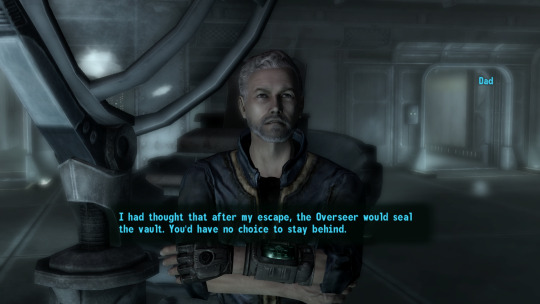
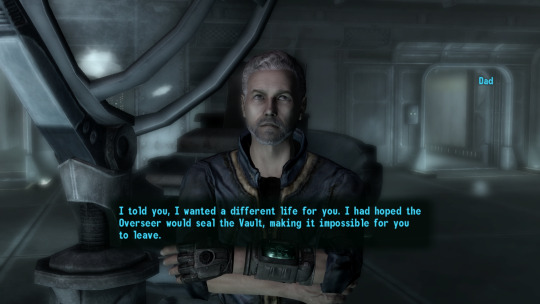
But the fact I can never explain what happened when reunited with him is just so ODD!?!?!!?

I COULDN’T STAY!!!!!!!

I FEEL LIKE THIS IS IMPORTANT INFORMATION YOU SHOULD WANT TO KNOW DAD!!!!!

WHY ARE THESE MY ONLY OPTIONS?!?!?!?!!!!!
Why give me that entire section where I had to escape the vault to avoid MURDER!!?? If they were going to back me in a corner (dialogue wise) that I would've gone after my father no matter what.
It would've made the dialogue option, "Why would you throw away the life we had?" WAY MORE INTENSE AND INTERESTING IF I COULD TELL HIM HIS ACTIONS UNINTENTIONALLY AFFECTED ME!!!
It could've been followed by a cute bonding moment where he apologizes and says while this life was never what he wanted for me he'll now help me adjust however he can.
#WHICH COULD'VE LEAD TO EVEN MORE UNIQUE DIALOGUE!!!#Accepting his offer + Being Neutral and saying you need to do this on your own + CRUELY REJECTING HIM!!!#At least Vault 112 was REALLY COOL!!!!#I had fun doing everything Stanislaus Braun wanted before reloading to an older save.#FIGURING OUT THAT MUSIC PUZZLE WAS VERY VERY FUN!!!!!#Fallout 3#Fallout 3 Spoiler#The frustrating part is I'M ROLEPLAYING AS A CHARACTER WHO WOULD'VE GONE AFTER HER FATHER NO MATTER WHAT!!!!#But is also grieving the loss of the potential life she could've had inside the vault and her lack of choice.#How she HAD to leave because of her Fathers actions and is now feeling lost in this new world he never prepared her for.#MAJOR SPOILER ->#My only guess is it's because dad dies later on RIP I knew he died but I thought it was dependent on your karma.#SO IMAGINE MY SURPRISE!!! I really thought he was going to live in my route.#Writing my The Lone Wanderer the biggest revenge arc!!#Where she has to not betray herself and her morals in the process of getting revenge.#Long Text#Long Post#MaddyPlaysFallout3
15 notes
·
View notes
Text
q!BAGHERA post because I am ecstatic
I want to talk about what happened yesterday (just in case, this isn't about drama or whatever this is talking about what the evolution of the character might be, no discourse, no drama, this isn't the subject of this post) because of HOW MANY POSSIBITIES IT OFFERS for Baghera and how TERRIFYING they all are.
Let me tell you I am terrified (ecstatic I love the angst gimme) because Baghera yesterday, discovered what BBH did (only partially, she doesn't know about the torture yet.. OH and when she does...). But that's the thing. She was upset at BBH, but what's worse is what BBH did to her. As of late Baghera has been lost, scared, and while everyone has moved on in their grief (they are all still grieving obviously, but they are at a point where they have grieved quite a bit and are now trying things) she has not even gotten the occasion to at all. She is trying to grieve her missing children AND her childhood she remembered she never had, AND Bad which is very obviously looking terrible, but everyone is moving along, trying to pass on to other things or trying to find solutions. Forever comes and tell her to try and be happy, but how can she ?
Here comes yesterday. Here comes BBH. I always suspected, and it was proven multiple times that Baghera was very much his moral compass. But at the time she came back, it was already to late. It was done. He did the mistake. And the thing is BBH is one of the only ones she decides to trust with some of her secrets, because it's her bebou, it's her partner in crime. It's the father of her children. And Bad decides to do the same, except HE puts her at test. She doesn't know it yet, he asks her to make the promise not to tell anyone and not to intervene. She oblige, obviously. And he shows her.
And she is shocked, she is starting to stress out. She is obviously angry at Bad, and at the same time... She promised, but it's fucked up, but it's her best friend, but it's too similar to her childhood she has to help, but it's Pomme's father she can't betray him. And when she makes it clear to Bad she is not happy he starts behaving in a way he never did with Baghz (when I tell you I got chills) , when he lied to her before it was mostly playful, but there it felt like manipulation, he cut her words short, "Is he oka-" "Yes he is don't worry.", he doesn't let space for her to be mad.
She promises to Ron. "I'll get you out of here. Give me one or two days"
And then when Forever etc. comes around she is still processing all this and she makes a quick decision, a terrible one. She lies to them. She protects Bad. But it's also to protect Ron. She may have an occasion to free him. And in that moment, she hates what she is doing. She doesn't want to lie but Bad has put her in an impossible position. And in trying to solve everything, to not betray anyone, she is forced to betray everyone. And she realises it. She hates it.
And that's where we get for what happens then. Because she is already lost and lonely, and one of the only person she could have used to get out of this downward spiral has betrayed her. He has lied and made her betray everyone else. And she will have to betray him soon. She will feel truly alone. She feels like she betrayed Forever, and in a way she did. She feels terrible, she can't trust him anymore, she has crossed the limits herself, she is too afraid. The French suspect her of things, she suspects them in return. (obviously she will still play with all of them because cc!Baghera is still friends with all of them, what I mean is she will just bottle up all those feelings again.)
That leaves three options.
First is Fit. But even if there is mutual respect in their respective secrets, that respect includes NOT giving away their secrets.
Second is Jaiden. "We have to stick together." But unlike anyone else, this will most likely end up in a downward spiral as well. They will just comfort each other in their compassion for Cucurucho, and in the end their past with the Federation.
Last is her "true and only" family. When she will truly be alone, there will be one option, that will always remain open.
The Federation.
Basically, unless there is an unforeseen turn of events, that can always happen, I want to say she is doomed.
And I can't wait to see what cc!Baghera comes up with.
#qsmp#qsmp baghera jones#qsmp baghera#qsmp forever#qsmp pomme#qsmp badboyhalo#qsmp bbh#qsmp french#qsmp fit#qsmp jaiden#qsmp federation
79 notes
·
View notes
Text
spoilers for nimona (2023)
just watched the new nimona movie and it was fantastic! great children's movie, excellent animation and clean plot progression. but it's missing something: the subversive morality that i first experienced when reading nimona as a kid.
in the actual comic, nimona killed people. she was morally gray- she took that step into murder and atrocity. in the movie, she's a punk kid who likes to make (admittedly pretty scary) faces and joke around about death, but it doesn't seem like she's actually gotten around to the real murder part.
and you know what? i get it.
this movie isn't meant to be the book, and that's fine. it's a wholesome misunderstood hero story for kids and a non-controversial way to have positive queer representation without compromising the themes with characters that aren't 100% good and sweet and lovely. it's great for a mainstream audience.
here's the thing: it would've been so much more INTERESTING if nimona WAS the killer. i was expecting it as a plot twist the whole movie- nimona impersonating the director (who was, tbh, not a very interesting twist villain, especially with her lack of forshadowing and her very easy and quick admit to her crimes- you'd think such a high-ranking individual would know better than to confess her sins and then murder the direct descent of gloreth in her office)
nimona has been trying and trying to convince ballister to reform the system the whole movie, saying that he SHOULD be mad, the INSTITUTE is what's in the wrong, not JUST the director. they can't run away- they have to fight back! that would've been such good foreshadowing for her having orchestrated the whole thing, with her being clearly shown to be able to shift into other people.
i'm almost convinced that the writers initially planned for that as the plot progression and then edited it to make it more family-friendly.
so in an ideal world, here's what i think should've happened:
nimona actually does frame the director for the murder- but as revenge for experimenting on and torturing her, as in the book. ballister is pardoned by the public and by ambrosius, but then the director shows the video footage of nimona shapeshifting into her, and the consequent sword-swapping. in a nutshell, nimona uses ballister to kill the queen and tries to manipulate him to help the world change, for a place where she isn't tortured needlessly just for being different.
ballister, betrayed, fights with nimona (insert key weakness that she has told only him here) and she is captured. the director informs him of the experiments on nimona (while dismissing her as a heartless monster) and he is horrified. the director reveals her new plan to get rid of (non-existent) potential monsters in the city like nimona (witch-hunting, reference to eugenics, you get it). ballister and ambrosius free nimona, and they work together to stop the enby-murder laser or whatever, nimona sacrificing herself in the process (or does she...). the ending remains the same from there.
the unfortunate issue with queer media at the moment is that people need it to be pure- a depiction of a morally gray queer character right now might throw the whole theme into question. after all, if queer people aren't perfect, than they're dead. which is interesting, because that's kind of the theme of nimona, in a sense. a narrative about people who are different, and for that reason alone are unforgivable monsters.
queer and disabled folk (see attorney woo, a show i love, for a similar problem) aren't allowed to be flawed in media. if they're not paragons of humanity or supergeniuses, they can't be accepted. nd stevenson was one of the first authors i ever saw really subvert that in widely known media meant for teens.
real life people aren't going to be as forgiving as the movies make it look. i liked the old nimona because she reflected that- she was not a sinless matyr in the end- she gave into her rage and despair and let it warp her. did that make her a monster? no- it made her human. queer media is trying its best, but in the end the issue is the very inhumanity of perfection.
67 notes
·
View notes
Text
The Prisoner's Throne review
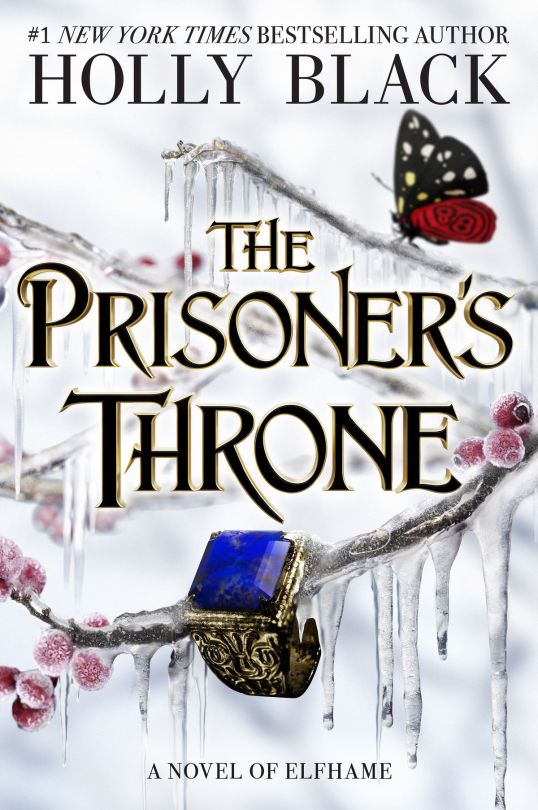
5/5 stars
Recommended if you like: scheming, court intrigue, faeries, morally gray characters
Stolen Heir review
First, I want to say I called it regarding Oak being exactly the kind of person you would think he would be after being raised by Madoc, Oriana, Jude, Cardan, and Taryn (and the Court of Shadows). How any of his family members were surprised by that I have no idea. I'm also happy to say that Taryn actually does seem to have gotten herself together and is much more tolerable in this book than in TFOTA (of course, that was also 8 years ago and Oak's POV is not Jude's, but still).
I enjoyed Stolen Heir but I think I like this one better. I did miss Wren's POV, though like with Oak's in book 1 having her narrate would obviously give some things away. The first book was quest-based and so we got to see a lot of new people and places, and much of the plot centered around the details of the quest. This one, on the other hand, is more along the lines of what we saw in TFOTA, where it is court against court and scheming abounds among those who want power. Questing plots are fun, but I do think I prefer this kind of intrigue.
I was so excited to see Jude and Cardan! I found it interesting to see them through someone else's eyes, since in previous books we've only ever seen them through their own, but Oak is Jude's younger beloved younger brother and Cardan's nephew and BIL, so he has a very different view of them than they do of themselves. That being said, they are more or less exactly as we remember and I enjoyed getting to see their interactions and reading their sass.
Oak is a trickster and a liar. He is, as mentioned, exactly the kind of person you would expect considering his family and the people he grew up around. He's good at scheming and seeing what people want, but he's also incredibly loyal and would do anything for his family. Unlike his father and sister, Oak still doesn't have ambitions for the throne. But that doesn't mean he isn't still involved in court intrigue, and this book shows us just how involved he is and the manipulations he's willing to use to protect the throne. It was interesting to get inside Oak's head since he's a child in TFOTA and Wren is technically a newcomer. Oak does feel like he needs to live up to what his family needs and the sacrifices they've made for him (though let's be honest, Jude's queenly ambitions only started with Oak, she sustained them on her own), and that creates an interesting dynamic. Related to this and to his scheming, Oak has so many layers and masks to portray the things he wants people to see that he also feels like people don't really know him, and it was interesting to see how that plays out.
Oak and Wren spend a lot of time separated in this book, but it's clear Wren is trying to get a grasp on what's going on and what exactly she wants. There are enemies closing in on all sides, and she struggles to find a workaround for all the people demanding things from her, and who have the power to make those things happen. While I know it would probably spoil some of what she's planning, I would've liked to have Wren's POV in this book alongside Oak's. I feel like we are missing part of the story by not having it, and I'd like to know more of her thought processes and how she decided what was a strategic decision vs not. That being said, we do get to see how Wren behaves when she feels she's been betrayed, and we also get to see how far she'll go for those she's loyal to. She and Oak have that in common, and the two are seemingly willing to rend anything, including themselves, apart in order to save those they love.
I enjoyed following the schemes of this book and learning who the new enemies were. Bogdana is obviously a major player, but there are people in the background that get revealed as the book progresses. In TFOTA, the game is putting someone on the throne and keeping them there. In this book, it's about determining who is out for the throne and what (and who) they have on their side, all while trying to balance competing priorities.
I'm particularly interested in the setup at the end of the book that seems to promise at least one more book set in Elfhame/involving the Greenbriar-Duarte clan. Holly Black had an interview that basically said as much, so I'm super interested to see where that goes (here's hoping it's Jude and Cardan again!).
Overall I enjoyed this book and seeing how Wren and Oak's story ended. It was interesting being inside Oak's head, though I did miss Wren's POV as well. I'm looking forward to future books set in this world!
#book#book review#books#book recommendations#fantasy#bookstagram#booklr#bookish#bookaholic#bookblr#book addict#fantasy novel#ya fantasy books#ya fantasy#holly black#folk of the air#cruel prince#stolen heir#prisoner's throne#oak greenbriar#queen suren#jude duarte#cardan greenbriar
10 notes
·
View notes
Text


✨✨Writeblr Intro✨✨
Hi! I’m new to writeblr and I hope to become more involved with the writing community on here!
I’m a university student majoring in Archaeology which of course means I’m obsessed with everything old and ancient, which can be seen in a lot of my stories (*cough* time travel *cough*). I’ve been in love with making up stories and characters since I was little but I never really thought of myself as a writer. Honestly, I didn’t even think about writing my ideas down until this past winter when I started using Wattpad again. I found some amazing stories (shoutout to @screamingatanemptyroom) that inspired me to start writing and now I can’t seem to stop.
Anyways, here are a couple of my stories in the works✨
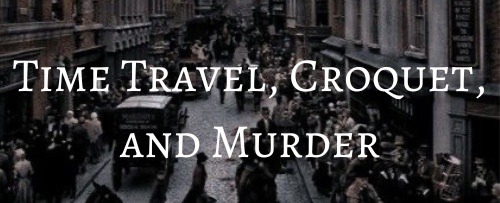
Introverted University student Evelyn Chandler has been enlisted by her history Professor to travel back in time to 1890s New York to gather firsthand information from the past. When Evelyn is betrayed by one of her team mates, she suffers brain damage and is left to navigate the past without any idea of where (or when) she is from. With the help of an awkward detective, she fights her way through oppression, a corrupt government organization, and a dangerous serial killer who seems hellbent to have Evelyn by their side.
—————————————
“This could go one of several ways:
1. We could get there successfully, complete the mission and come home.
2. The machine could blow up killing us all in the process.
Or 3. We could end up somewhere completely different wearing our asses as hats.
What the hell have I gotten myself into?”
——————————————
Genre: Historical fiction, Mystery, Romance.
Progress: 24 chapters (not published)
*My first story ever and it’s my pride and joy
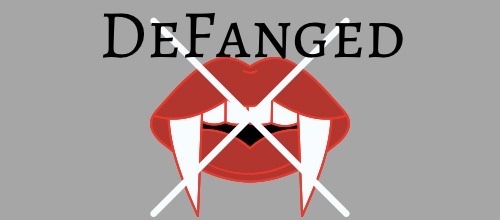
Emilia Rosewell is a normal, high school hating teenager who wants nothing more than to graduate without too much drama. Unfortunately, an attractive new guy mysteriously sweeps into town and ruins her plans.
While vampire romances have never been an interest to her, Emilia finds herself in the middle of a magical world of bloodsucking hotties. Unbeknownst to them, she's not going down without a fight. She'll have a normal life, even if it means defanging a couple thousand immortals along side a brooding vampire hunter to get it.
————————————
"This is what I am, Emilia. I'm a monster." He whispered.
I thought for a moment, stunned but also realizing the true weight of the situation.
"Damn straight you are."
"Wha—" he began but I cut him off, justifiably enraged by this new information.
"You've been asking me out, telling me you're in love with me, and this whole time you were an old perv in a younger body!?" I shouted, pointing an accusatory finger. "It's extremely apparent that you're a monster, just not in the way you thought."
———————————-
Genre: Paranormal fiction
Progress: Mostly major scenes, no full chapters
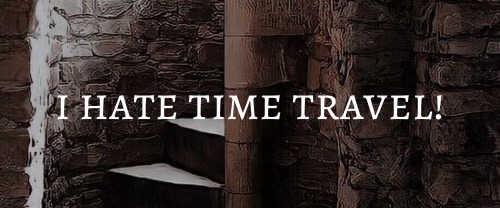
When Ella Reed is transported back in time to the Medieval era, she is taken prisoner by the royal guard. This past, she soon finds out, is far from what she learned in history class. Unless she missed the unit about dragons, magic, and dangerous sorcerers who tempt your morals.
Will Ella ever get back home or will she be stuck in this strange new world forever?
————————————
There was noise coming from in front of me, like something big was running through the trees. The unmistakable sound of an animal came closer.
Is that a freaking horse!? What kind of a budget do these guys have?
I darted to to the side of the foot path hoping the trees would give me enough cover. I dove behind a large bush and hid there for a moment waiting for the large animal to pass. No matter how good I was at track and field I cannot outrun a damn horse.
Two seconds later, a horse carrying a rather large man with a sword drawn zoomed passed. A sword. What the hell does he need an actual sword for? Cutting large vegetables? I wonder if he has a license for that.
—————————————
Genre:Fantasy
Progress: The first two chapters are out on Wattpad now and I’m working on updating soon (can be found here)
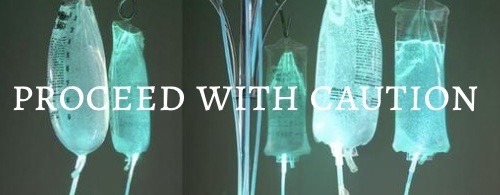
Danger lurks within the confines of normal society; corrupt law enforcement, secret organizations with hidden agendas, and human experiments with horrific outcomes.
Snarky and chaotic Nora soon finds herself enthralled in this hidden world and gives her captors a run for their money. Right when she thought all hope was lost he shows up, an infuriatingly attractive new scientist who seems hellbent on her release but she can't seem to pinpoint his motive.
Maybe she could use him to her advantage or she might just get more than she bargained for.
—————————————-
I occupied myself by making noises with my mouth, the only entertaining thing I could think of that doubled as an annoyance to the good doctor over there.
After a particularly loud noise one of the guards snapped his head towards me. "Oh my God, do you ever shut up!"
I took a sharp intake of breath and pretended to ponder on it a moment. "Nope," I said popping the 'p' and continued making the noises.
Maybe I was acting like an annoying brat but I'm not about to be a star patient in this hell hole.
If I have to deal with their bullshit then I'll make damn sure they have to deal with mine.
—————————————
Genre: Fiction, humour
Progress: 4 chapters posted on Wattpad so far (can be found here)
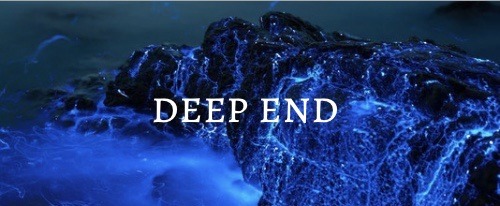
Elara has everything; wealthy parents, a gorgeous fiancé, and her dream job all lined up for her perfect future. But of course not all is as it seemed. Her parents treated her like a stranger, her fiancé was an arrogant prick, and her dream job only cemented her further into this miserable life.
When her fiancé publicly breaks off their engagement for another women, Elara’s life comes crumbling down around her, so she goes to the one place she felt safe; the forest clearing where she and her friend used to play as a child.
But since when was there a glowing lake here and why the hell does the guy guarding it look so familiar?
————————————
"You can't go in there," he said, though he didn’t make any move to stop me.
"Really? Cause last time I checked this is a free country."
"There will be consequences that—“
"Oh spare me the lecture! everything has consequences, the only question is whether you have anything to lose." I stared at the glowing water, an instinctive, ancient desire welling up inside me. "And as it just so happens, I no longer do."
———————————-
Genre: Fantasy/supernatural fiction
Progress: obsessed with the storyline but no complete chapters
✨So far these are all the formulated plots but I have a lot more that I’m still forming, so there will probably be updates!✨
Thanks for reading!
41 notes
·
View notes
Note
I loved your yandere Drukkari.How they would react with Sadie????
Oh my gosh, thank you! This is short, because once again my laptop ended up deleting half of what I originally wrote and it ended up shrinking in the rewrite process, so don't judge it too hard, lol.
"I'm not agreeing to 'no mind control'," Druig said frankly, a lazy smile raising one corner of his mouth. "Mind control has to be on the table."
Sadie sighed and put her pencil down. "I understand why you feel that way," she said slowly, "but do you understand how small a concession 'no mind control' is, from a human perspective?"
"That's because humans think very highly of their own decision-making skills. As an ancient, immortal being, I find their confidence unearned."
"Are you saying that you're unwilling to compromise?"
"'No mind control' isn't a compromise."
"Okay. How about 'No mind control except in cases of imminent physical danger to my person'."
Druig considered this, then sat back in his chair. "Ehh, still no."
"Why not?"
"There are plenty of ways for you to get hurt that don't count as 'imminent physical danger'. I need to be able to take control whenever I feel I have to."
"If you're not willing to agree to any of my terms, then what's the point of making a contract?"
"You like contracts and we like you," Druig said simply. Trailing a fingertip over the back of her hand and drawing an imaginary heart.
"But you don't respect my autonomy," she probed, "because you consider me a lesser being."
"Not lesser. Just...younger." The depth of his eyes betrayed his age.
Makkari tapped Sadie on the shoulder. "How about mind control is allowed, but afterwards we vote on whether it was necessary, and if at least two of us agree it wasn't, then there's some consequence."
"Meaning it's up to you when it's okay and when it's not?" Druig said. "Since I will probably always say it was necessary and Sadie will probably always say it wasn't."
Makkari nodded, unabashed. Her eyes were also deep with millennia of wisdom, but she wore the years differently. Where Druig seemed to always have the energy of either a father keeping a small child from touching the hot stove or a father watching out of the corner of his eye to make sure the small child isn't walking up to the stove again, Makkari's energy was that of full and profound internal comfort. Sadie had never seen Makkari appear to doubt herself or question herself. Makkari didn't know everything, nor would she claim to, but she knew herself better than anyone.
Druig dipped his head. "Well, I trust you, darling. I can agree to that if Sadie can."
Sadie considered for a second. She didn't find it an adequate concession on his part, but it was progress. She took up her pencil. "I'm writing it down, but I'm going to want to discuss this again later."
"Of course." Druig winked at Makkari.
Sadie had to smile, just a little, at the sight. She would continue to fight for her right to not have her decisions piloted by someone else or made subject to review, but she didn't hold much against the Eternals otherwise. They had done a lot for humanity, and their morals were worlds better than Sadie would have expected, given the opportunities their powers provided and their having been around for all of humanity's cruelest events.
They had also seen a lot of humanity's best.
And the way they looked at her...it was like they were seeing it now.
Sadie set her pencil down again and cleared her throat. "Okay, next item. Makkari, I know one of your love languages is gift-giving, but I think decorating my house wall-to-wall with stolen artifacts, treasures, and gadgets might not be the best idea."
"Why?" Makkari asked.
"Are you worried about the police?" Druig added. "Because they don't come here. Anymore."
Sadie raised an eyebrow. "Yes, the fact that you're intermittently controlling everyone in town is next on the list; don't worry."
Druig laughed, far from repentant.
#sadie lily gilder#rule one sadie#yandere druig#yandere drukkari#yandere makkari#yandere marvel#yandere poly
74 notes
·
View notes
Note
What draws you to incest ?
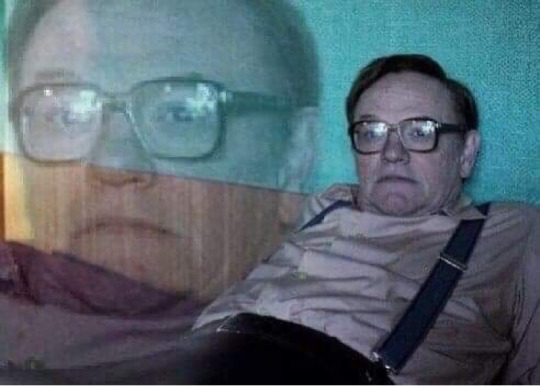
*sighs* Ok, here we go. I'm a real card carrying Jonsa now aren't I?
Anon, listen. I know this is an anti question that gets bandied about a lot, aimed at provoking, etc, when we all know no Jonsa is out here being all you know what, it really is the incest, and the incest alone, that draws me in. I mean, come on now. Grow up.
If I was "drawn" to incest I'd be a fan of Cersei x Jaime, Lucrezia x Cesare, hell Oedipus x Jocasta etc... but I haven't displayed any interest in them now, have I? So, huh, it can't be that.
Frankly, it's a derivitive question that is really missing the mark. I'm not "drawn" to it, though yeah, it is an unavoidable element of Jonsa. The real question you should be asking though, is what draws GRRM to it? Because he obviously is drawn to it, specifically what is termed the "incest motif" in academic and literary scholarship. That is a far more worthwhile avenue of thinking and questioning, compared with asking me. Luckily for you though anon, I sort of anticipated getting this kind of question so had something in my drafts on standby...
You really don't have to look far, or that deeply, to be hit over the head by the connection between GRRM's literary influences and the incest motif. I mean, let's start with the big cheese himself, Tolkein:
Tolkein + Quenta Silmarillion
We know for definite that GRRM has been influenced by Tolkein, and in The Silmarillion you notably have a case of unintentional incest in Quenta Silmarillion, where Túrin Turambar, under the power of a curse, unwittingly murders his friend, as well as marries and impregnates his sister, Nienor Níniel, who herself had lost her memory due to an enchantment.
Mr Tolkein, "what draws you to incest?"
Old Norse + Völsunga saga
Tolkein, as a professor of Anglo-Saxon, was hugely influenced by Old English and Old Norse literature. The story of the ring Andvaranaut, told in Völsunga saga, is strongly thought to have been a key influence behind The Lord of the Rings. Also featured within this legendary saga is the relationship between the twins Signy and Sigmund — at one point in the saga, Signy tricks her brother into sleeping with her, which produces a son, Sinfjotli, of pure Völsung blood, raised with the singular purpose of enacting vengence.
Anonymous Norse saga writer, "what draws you to incest?"
Medieval Literature as a whole
A lot is made of how "true" to the storied past ASOIAF is, how reflective it is of medieval society (and earlier), its power structures, its ideals and martial values etc. ASOIAF, however, is not attempting historical accuracy, and should not be read as such. Yet it is clearly drawing from a version of the past, as depicted in medieval romances and pre-Christian mythology for instance, as well as dusty tomes on warfare strategy. As noted by Elizabeth Archibald in her article Incest in Medieval Literature and Society (1989):
Of course the Middle Ages inherited and retold a number of incest stories from the classical world. Through Statius they knew Oedipus, through Ovid they knew the stories of Canace, Byblis, Myrrha and Phaedra. All these stories end more or less tragically: the main characters either die or suffer metamorphosis. Medieval readers also knew the classical tradition of incest as a polemical accusation,* for instance the charges against Caligula and Nero. – p. 2
The word "polemic" is connected to controversy, to debate and dispute, therefore these classical texts were exploring the incest motif in order to create discussion on a controversial topic. In a way, your question of "what draws you to incest?" has a whiff of polemical accusation to it, but as I stated, you're missing the bigger question.
Moving back to the Middle Ages, however, it is interesting that we do see a trend of more incest stories appearing within new narratives between the 11th and 13th centuries, according to Archibald:
The texts I am thinking of include the legend of Judas, which makes him commit patricide and then incest before betraying Christ; the legend of Gregorius, product of sibling incest who marries his own mother, but after years of rigorous penance finally becomes a much respected pope; the legend of St Albanus, product of father-daughter incest, who marries his mother, does penance with both his parents but kills them when they relapse into sin, and after further penance dies a holy man; the exemplary stories about women who sleep with their sons, and bear children (whom they sometimes kill), but refuse to confess until the Virgin intervenes to save them; the legends of the incestuous begetting of Roland by Charlemagne and of Mordred by Arthur; and finally the Incestuous Father romances about calumniated wives, which resemble Chaucer's Man of Law's Tale except that the heroine's adventures begin when she runs away from home to escape her father's unwelcome advances. – p. 2
I mean... that last bit sounds eerily quite close to what we have going on with Petyr Baelish and Sansa Stark. But I digress. What I'm trying to say is that from a medieval and classical standpoint... GRRM is not unique in his exploration of the incest motif, far from it.
Sophocles, Ovid, Hartmann von Aue, Thomas Malory, etc., "what draws you to incest?"
Faulkner + The Sound and the Fury, and more!
Moving on to more modern influences though, when talking about the writing ethos at the heart of his work, GRRM has famously quoted William Faulker:
His mantra has always been William Faulkner’s comment in his Nobel prize acceptance speech, that only the “human heart in conflict with itself… is worth writing about”. [source]
I’ve never read any Faulker, so I did just a quick search on “Faulkner and incest” and I pulled up this article on JSTOR, called Faulkner and the Politics of Incest (1998). Apparently, Faulkner explores the incest motif in at least five novels, therefore it was enough of a distinctive theme in his work to warrant academic analysis. In this journal article, Karl F. Zender notes that:
[...] incest for Faulkner always remains tragic [...] – p. 746
Ah, we can see a bit of running theme here, can't we? But obviously, GRRM (one would hope) doesn’t just appreciate Faulkner’s writing for his extensive exploration of incest. This quote possibly sums up the potential artistic crossover between the two:
Beyond each level of achieved empathy in Faulkner's fiction stands a further level of exclusion and marginalization. – pp. 759–60
To me, the above parallels somewhat GRRM’s own interest in outcasts, in personal struggle (which incest also fits into):
I am attracted to bastards, cripples and broken things as is reflected in the book. Outcasts, second-class citizens for whatever reason. There’s more drama in characters like that, more to struggle with. [source]
Interestingly, however, this essay on Faulkner also connects his interest in the incest motif with the romantic poets, such as Percy Bysshe Shelley and Lord Byron:
As Peter Thorslev says in an important study of romantic representations of incest, " [p]arent-child incest is universally condemned in Romantic literature...; sibling incest, on the other hand, is invariably made sympathetic, is sometimes exonerated, and, in Byron's and Shelley's works, is definitely idealized.” – p. 741
Faulkner, "what draws you to incest?" ... I mean, that article gives some good explanations, actually.
Lord Byron, Manfred + The Bride of Abydos
Which brings us onto GRRM interest in the Romantics:
I was always intensely Romantic, even when I was too young to understand what that meant. But Romanticism has its dark side, as any Romantic soon discovers... which is where the melancholy comes in, I suppose. I don't know if this is a matter of artistic influences so much as it is of temperament. But there's always been something in a twilight that moves me, and a sunset speaks to me in a way that no sunrise ever has. [source]
I'm already in the process of writing a long meta about the influence of Lord Byron in ASOIAF, specifically examining this quote by GRRM:
The character I’m probably most like in real life is Samwell Tarly. Good old Sam. And the character I’d want to be? Well who wouldn’t want to be Jon Snow — the brooding, Byronic, romantic hero whom all the girls love. Theon [Greyjoy] is the one I’d fear becoming. Theon wants to be Jon Snow, but he can’t do it. He keeps making the wrong decisions. He keeps giving into his own selfish, worst impulses. [source]
Lord Byron, "what draws you to—", oh, um, right. Nevermind.
I'm not going to repeat myself here, but it's worth noting that there is a clear through line between GRRM and the Romantic writers, besides perhaps melancholic "temperament"... and it's incest.
But look, is choosing to explore the incest motif...well, a choice? Yeah, and an uncomfortable one at that, but it’s obvious that that is what GRRM is doing. I think it’s frankly a bit naive of some people to argue that GRRM would never do Jonsa because it’s pseudo-incest and therefore morally repugnant, no ifs, no buts. I’m sorry, as icky as it may be to our modern eyes, GRRM has set the president for it in his writing with the Targaryens and the Lannister twins.
The difference with them is that they knowingly commit incest, basing it in their own sense of exceptionalism, and there are/will be bad consequences — this arguably parallels the medieval narratives in which incest always ends badly, unless some kind of real penance is involved. For Jon and Sansa, however, the Jonsa argument is that they will choose not to commit incest, despite a confused attraction, and then will be rewarded in the narrative through the parentage reveal, a la Byron’s The Bride of Abydos. The Targaryens and Lannisters, in several ways excluding the incest (geez the amount of times I’ve written incest in this post), are foils for the Starks, and in particular, Jon and Sansa. Exploring the incest motif has been on the cards since the very beginning — just look at that infamous "original" outline — regardless of whether we personally consider that an interesting writing choice, or a morally inexcusable one.
Word of advice, or rather, warning... don't think you can catch me out with these kinds of questions. I have access to a university database, so if I feel like procrastinating my real academic work, I can and will pull out highly researched articles to school you, lmao.
But you know, thanks for the ask anyway, I guess.
#cappy's thoughts#I'm still on my break/hiatus#i just had some of this already written#jonsa#jon x sansa#anti bs#grrm and medieval literature#grrm and william faulkner#grrm and the romantics#grrm and tolkein#grrm and old norse literature#grrm and his literary influences#was this petty lmao?
179 notes
·
View notes
Text
c!niki and c!wilbur enjoyers. pspspspspspsps
alright guys so last night i rewatched pretty much all of the pogtopia arc. and this isn’t meant to be a big, important analysis post (it’s kind of incomprehensible), because my brain is fried from, you know. rewatching pretty much all of pogtopia. but i do have some stuff i’d like to say.
(this also just became a niki meta sorry i love her. i really just got emo about her during the second half of this and it got long. i have a lot of feelings about her and wilbur’s friendship.)
it’s a pretty general conclusion that wilbur’s real “downfall” began on october 8th, during the stream “who are you go away”. of course, his spiral and the process of him losing faith had begun much earlier, more around the end of the first war or during the election. but the big switch, so to say, was definitely here, when as wilbur walks back from schlatt’s announcement, he asks tommy if they’re the bad guys.
this entire scene was so interesting to me. wilbur here is a man who has lost hope, someone who is backed into a corner morally and has nothing left. he points out that they can never really reclaim l’manburg without forever tainting it, and that schlatt knows this. the entire half an hour or so before, schlatt has been taunting wilbur about losing that power. the emphasis of the festival on “democracy” is so clearly a barb thrown at wilbur, and it works.
wilbur’s “nothing left to lose” in this vod is a mirror to niki’s “you know what they say about a woman who has nothing left to lose”. this will not be the first time they mirror each other.
basically, wilbur’s angry. when schlatt announced the festival, wilbur realized that maybe it wasn’t a terrible thing. so once he worked around into the mindset of “we’re the bad guys”, he was able to justify saying he was going to blow up the nation with no remorse. he wants chaos! he wants no survivors!
does he do it? god no.
during the streams leading up to november 16th, wilbur is consistently scared. he goes back and forth on it, and makes multiple “conditions” that determine whether he’s going to do it or not, almost begging someone to stop him. he whispers to himself that he’s scared, that his hands are shaking, that he’s not sure if it’s the right thing to do. because despite what he says about “not caring about any of them”, the instant niki is threatened after tubbo’s death, wilbur walks up to schlatt and tells him that if he’s going to kill anyone it should be him. later, when quackity and tommy talk him down from pressing the button, he can’t press it because they’re there and he can’t bring himself to kill them as well.
but he has no problems with putting his own life at risk. he refuses to wear armor half the time, and actively places himself in harm’s way to save others. he still cares about everyone else, as much as he says he doesn’t. even when he does cause harm to others, during november 16th, he immediately begs phil to kill him. “look, they all want you to.” he can’t live with what he’s done, and how he’s hurt people, but he couldn’t allow manburg to continue.
the man is terrified and angry and he can’t win. and even as he tries to stuff himself into the mind of someone who doesn’t care, he cannot. when he finally does, he cannot live with being that person.
but the reason i rewatched this arc was to see niki’s point of view, especially after her statements during her last stream. i genuinely think that wilbur’s only betrayal of her was pressing the button, because he betrayed everyone. they might have known he was going to do it, but they had faith he wouldn’t.
wilbur cared a lot about niki. her life under schlatt was awful, wilbur hated that she was suffering, and the scene where wilbur plants himself directly in the center of the festival and tells schlatt to kill him instead hits pretty hard. he has the argument with schlatt, and then turns to niki and tells her to run. he then hits people and sprints away, trying to give her time to escape.
this is also when he asks her to join pogtopia, because now that schlatt has said he’d kill her, it’s a safer place for her.
so the man did care about her. niki is angry at the memory of him that she has. it’s been twisted by time and her own grief and paranoia.
in rewatching pogtopia, i realized that a lot of people hate the memory of wilbur. not him, and what he did. they think he didn’t care. and to quote hamilton (apologies):
“history obliteratesit paints me in all my mistakes”
does niki have a right to be mad at him? absolutely. he caused direct harm to her by blowing up l’manburg, once it was reclaimed. but she’s wrong that he never cared.
(an interesting note: wilbur only blows it up after techno starts fighting people outside. he hears it, and says “look, they’re fighting”. he didn’t re-initiate the conflict of the country. the fact that even after peace was won people were fighting just gave evidence to his belief that the entire country was corrupted.)
niki has been hurt a lot, and wilbur has things to answer for. but we as the audience know that her statements are just her perception. she is a character who acts on perceptions. the entire stream was in black and white. during doomsday, upon seeing wilbur log on (as ghostbur), niki has a panic attack and destroys her bakery, trying to rid herself of the pain of the memories. her lines during this stream are chilling, whispered repetitions that are a mirror of wilbur’s end.
(paraphrased, it was long and confusing but there are a few bits and this was the essence of it)
“wilbur is gone. this isn’t happening. he is dead. l’manburg is gone.”“it is real, i am real, he is real and he is dead.”“l’manburg is gone, i am real, i am l’manburg”.
(god. dude i could spend Months analyzing this one stream alone. there’s so much here.)
doesn’t that sound a bit like “my unfinished symphony”? wilbur and niki both attach their own self to the nation they fought for, and can see it as an extension of themself. they both destroy parts of it in acts of fear, attempting to save everyone else from what they’ve made.
what i pulled away from niki’s stream is that she’s not healing. i remember the chamber she locks herself in at night. i remember her refusal to eat. i remember how she was so angry at tommy, and she later realized that anger was misguided. niki genuinely believes that wilbur did not care about her, and that’s not surprising: when he died, she denied the fact that he was gone. she represses the things that she can’t handle, same as lots of other people. it is easier for her to pin her hurt on wilbur, because she needs somewhere to pin it. people feel more in control if they’re angry, not sad.
the song cc!niki said was for her character really emphasizes this. it’s a coping mechanism.
but even condemning wilbur won’t help, because she will still never get closure. niki cares about what others think of her, and so she can’t move on from someone hurting her. she can’t move on because she thinks he hated her. she is angry that he is back, but it is an opportunity for her to heal. she couldn’t heal when he was gone. she’s not the only one with a negative perception of wilbur, after all. he has one too. the two of them really need to talk.
i want niki to be healthy and safe. i want to see her heal so badly, and i do think it will happen. after wilbur died, his betrayal of her stayed with her, and it eventually became her memory of the betrayal that she hated, not the thing itself. it’s been months since it happened. niki wants to find an outlet for her hurt, because she wants to feel better. there’s a pattern i noticed: she only gets mad at people once she hasn’t seen the person themself for a while. and once she sees them and talks to them, and realizes that they care about her and don’t want to hurt her, she stops blaming them for it. she only hates her perception of them. example one? tommy.
man was in exile for a long time, and when he came back he “brought” fighting. that’s how niki saw it. but the fact that after she spent time with tommy (trying to kill him but. details, details) she forgave him because she saw it wasn’t his fault is a really good sign.
i genuinely think that speaking to wilbur will help niki, and it will also help wilbur. after all, they both hate wilbur. the entire perception of wilbur as some heartless, crazy manipulator needs to be shattered for both of their sakes. they both buy into it.
i want niki to know that others care about her, and that she has places she can feel safe. she hates that wilbur is invading the syndicate, because she’s scared of his memory hurting her. i don’t think wilbur will hurt her on purpose, because even though he sees himself as awful, he doesn’t hate her. he never did.
usually, with people who have hurt someone else, i want them as far away from the person they hurt as possible. if wilbur does hurt niki i’ll probably cry. but again, it’s not him that hated her, or really him that hurt her in the way she thinks he did. when wilbur was dead, niki didn’t get any better. her memory of him festered and made her feel worse. that’s also why niki killing wilbur or hurting him somehow wouldn’t help her heal. i want wilbur to explain that he didn’t hate her. is wilbur even close to self aware enough to help niki? nah. this is going to take a Long time, and it’s going to hurt.
last thing i swear lol
during niki’s stream, she says that wilbur manipulated her. again, i watched pogtopia last night, and i’ve watched the rest of season one recently as well. i genuinely don’t see it. but i do think i know why she said it.
during season one, wilbur doesn’t manipulate niki. he doesn’t have a chance to later, he’s dead. so then, what is she talking about? of course it’s a perception, same as a lot of her other claims. i think she’s talking about how she cared for l’manburg.
niki joined the server as wilbur’s friend, to join his nation. she grew to care for l’manburg. she devoted herself to it, same as he did. but doomsday showed us that she hates that. in niki’s eyes, l’manburg only brought pain for people, and because she ties herself to it, she hates that she ever cared about it. she can’t allow herself to care for it, because it was used to hurt. so how does she cope with knowing that she once did? she pretends she didn’t.
if she can convince herself that it was wilbur who convinced her to care about l’manburg, she can avoid blaming herself for her own pain. and yeah, she shouldn’t blame herself for it. it’s not her fault. the entire situation is tragic and a little hopeless and once again really makes me hope that she recovers. l’manburg was ruined for her by others. schlatt, techno, dream, wilbur. again another place where she and wilbur are similar: they convince themselves they never cared about l’manburg because of the hurt it caused.
to summarize: wilbur’s going to get a shock soon. don’t know when, but probably the prison visit. something is going to shake his perception, the story is hurtling towards that. once he is able to take responsibility for what he did, and feel safe (because a lot of what he does now is out of fear of being alone or useless), then he and niki need to talk. niki needs something to get her out of her own head. she’s spiraling too. they are essential to each other’s recovery because of how much they meant (and mean) to each other.
anyways i miss early season one niki i liked it when she was happy :(
~ Lad 2
#wilbur#c!wilbur#niki#c!niki#dreamsmp#dsmp#mcyt#rp#long post#dreamsmp analysis#dsmp analysis#revivedbur#pogtopia#lad speaks
267 notes
·
View notes
Text
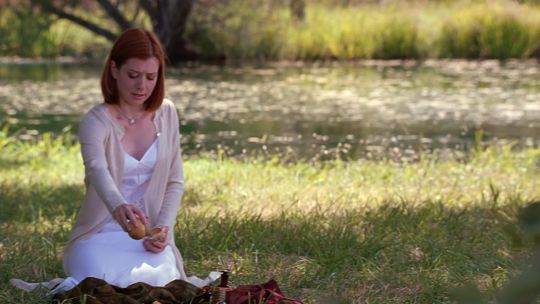
I want to talk about this scene, from Bargaining when Willow kills the fawn. You might guess from my icon that I am a big fan of this scene. It's pretty short but it sets the stage for Willow's arc throughout S6 excellently.
It opens with her in this gorgeous riverside greenery, dressed in pure white, the very picture of fairytale innocence, bathed in bright sunlight. It's such an unusual shot for the show, which almost exclusively either has shots inside or at night (for obvious reasons of being a vampire show), and that immediately makes it quite memorable. Especially as the rest of the episode is almost entirely set at night, filled with demon bikers, dismemberment, fire, broken down towers and digging out of graves. It's like this little meditative moment of peace in between all that.
Or, it would be if it didn't include a teensy little animal sacrifice.
WILLOW: Adonai, Helomi, Pine. Adonai, Helomi, Pine. The gods do command thee from thy majesty. O Mappa Laman, Adonai, Helomi.
Willow says her words and summons forth a young fawn from the trees. The fawn is another symbol of innocence, like Willow's white dress. As she reaches out and and touches the animal gently, we're reminded of the soft innocent Willow of S1, who shied away from any conflict and seemed incapable of ever hurting a fly. She's like a disney princess, sitting in the woods singing to woodland animals. Only Snow White never stabbed Bambi in the heart.
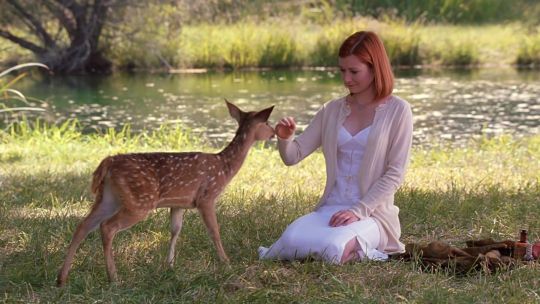
The entire plot of the previous season revolved around the blood sacrifice of a child. This is what Glory was trying to achieve, and it's what Buffy has to stop. Buffy gives her life in order to stop it. And now, Willow recreates the same event, performing the blood sacrifice what is specifically an animal child. She steps into the role that the previous season's Big Bad performed, and so tells us that this season, she is stepping into the role of Big Bad. The fawn fills the role of Dawn - the situations rhyme as well as the names do.
Fun fact - the words that Willow uses are taken from The Book of Ceremonial Magic, a 1910 book that compiled various grimoires. In this passage, describing an invocation to request something from God, Adonai/Helomi/Pine are the names of angels - specifically the angels of the East, who appear in human form dressed in lily white according to this passage - another link to Willow's costume here. The invocation seems to involve requesting these angels to appear to the caster in an intelligible form.
ADONAI, HELOMI, PINE, Whom you obey, do invoke, conjure and entreat thee, N., that thou wilt appear forthwith. By the virtue and power of the same God I do command thee from thine order or place of abode to come unto me and skew thyself plainly here before me in thine own proper shape and glory, speaking in a voice intelligible to mine understanding.
In this case, Willow is symbolically killing an actual angel of heaven, which is probably pretty high up on the villainy scale. Just drives home the fundamental Wrongness of this scene. It's also good to remember that the idea of killing one to save other(s) is a theme returned to again and again throughout the show, and the first major example of that theme in action is a certain Angel.
(Credit to this user on BuffyBoards for finding the source of these words.)
So the fawn is Dawn, and the fawn is an angel. But most importantly of all - the fawn is Buffy. Willow, in her attempts to bring Buffy back to life, first has to kill "Buffy".
WILLOW: Come forward, Blessed one. Know your calling.
The fawn is described as having a "calling" that it must "know", just as Buffy has a calling of her own, which over the course of many seasons she learns to know and accept (and eventually revolutionise and reject). It is also described as "Blessed", which in some definitions is taken to mean "one who is with God in heaven". Buffy at this point is literally in heaven (or at least some kind of heaven dimension, the theology is gratefully vague). The structure of the phrase "Blessed one" also reminds of the more relevant phrase - "Chosen One", which again would be Buffy. The spell ingredient, which we know is the fawn's blood, is called "vino de madre" - wine of the mother, implying a feminine source of power, just like The Slayer.
WILLOW: Accept our humble gratitude for your offering. In death ... you give life. May you find wings to the kingdom.
In death, you give life. You might say that death... is your gift... yeah, so this really drives it home for me. Using death to give life is literally what Buffy has just done. It was core to her arc last season. And finally the "wings to the kingdom" line again plays into that heaven imagery. S6 loves this kind of imagery for Buffy, even giving her angel wings in one of the most delightfully on-the-nose shots in the show.
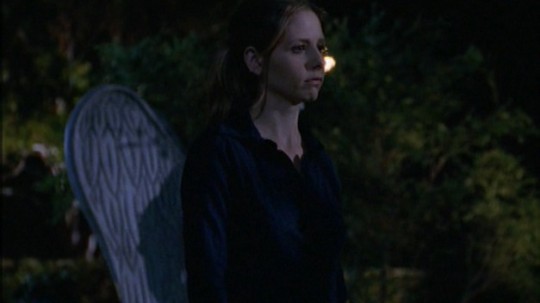
Buffy gave her life to give Dawn one, and with it gave a warning about the struggles of life - "The hardest thing in this world is to live in it.". This is sad but lovely advice that Buffy herself must now spend S6 gradually learning to understand herself. She learns how to deal with the crushing despair of day-to-day existence. Willow, as the Big Bad of this season, doesn't understand this advice at all. For years now, Willow has used magic as a short-cut to avoid actually dealing with her emotions (see Lover's Walk, Something Blue, Tough Love). This goes into overdrive in S6, and it starts with her desperation to bring Buffy back to avoid really dealing with the reality of her death.
In fact it goes beyond magic - Willow is also the one who uses her tech knowledge to bring the Buffybot back online. She uses all her skills to desperately fill in the hole that Buffy has left behind. This is what Willow does, magic or no. And it's sympathetic - my heart breaks every time she talks about fearing where Buffy might have ended up - but it's not totally rational or healthy either. The main problem is that Willow, in doing this, is ignoring Buffy's final words, and misunderstanding the central theme.
As said earlier, by performing this blood sacrifice of a child, Willow is betraying the memory of Buffy, who died to stop one. (Symbolically of course. Morally there are light years between killing an animal and killing a teenager). Buffy gave her life to stop a blood sacrifice, and so Willow reverses the process - causing a blood sacrifice to give Buffy her life. And she betrays Buffy's final words with her refusal to accept the pain of life and live with it. And finally, she betrays Buffy spiritually.
Remember that Willow is Buffy's metaphorical Spirit, as shown in Primeval. It is a special kind of betrayal that Buffy's Spirit breaks her spiritually in this season. She literally rips her soul out of eternal bliss and contentment, causing an existential break within her. She beseeches the fawn/Buffy to find "wings to the kingdom", but in doing so robs Buffy of her wings.
Buffy suffers brutal depression this season, and describes it many times as feeling dead inside. This kind of emotional deadness is caused directly by her ressurection (though severely exacerbated by her unresolved trauma, grief over Joyce, and generally just living under capitalism). Willow has tried to give death to bring life, but because the action is a betrayal of Buffy on many levels, the act is tainted, and perverted, like a wish on a monkey's paw. She literally kills metaphorical Buffy, and so metaphorically kills literal Buffy. Buffy has life, but said life is causing a kind of death within her.
And what does Willow get for all this? Her pain isn't fixed by all this. She just gets blood on her hands (and later on her face). It sets off a chain of events that will end with far more blood on Willow's hands. She dips a toe into a darkness, but because she doesn't understand fully the emotions that have taken her there, she can't exert any control over it. She doesn't learn a lesson here that she shouldn't try to shape the world to deal with her emotions. Instead, she learns that she has power over life and death.
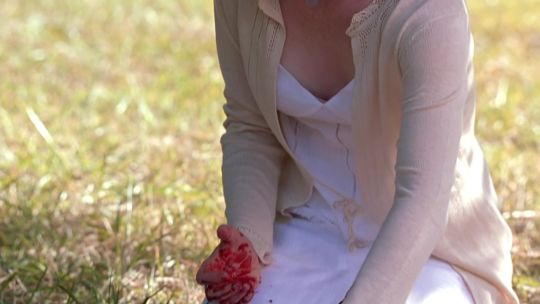
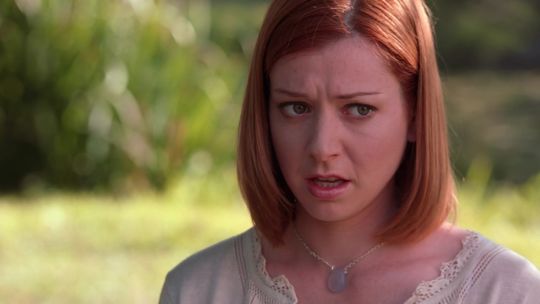
Willow is clearly deeply shaken by this, but it's not nearly enough to make her change her path. She ignores the very obvious foreshadowing here - her hands literally coated in blood - and carries on anyway. She takes the wrong lessons from this moment, which she clearly demonstrates in her argument with Giles in Flooded, where she ignores his anger over how she's warped the rules of nature, and instead focuses on how awesome she is ("The magicks I used are very powerful. I'm very powerful. And maybe it's not such a good idea for you to piss me off.")
This is a small scene, but it sets up so much for Willow. It shows how far she has come from the meek girl of S1. And it shows a glimpse of the future, how she has far to go but is now on a path to become the villain she is at the end of S6. She starts it by killing metaphorical Buffy in order to save her, and will end it by trying to kill actual Buffy in order to emotionally "save" her. At every point she can justify the blood on her hands as serving some greater purpose - but the blood is still there.
234 notes
·
View notes
Text
I have spent all day thinking about Unprepared Casters Arc 6 Episode 6, and have finally processed the events enough to put a post together - So spoiler alert for The Glacerian Trail Episode 6 I guess. Buckle up, it’s going to be a doozy.
Gosh, I have so many emotions about the whole Remeny vs. Beryl situation. It’s interesting, because of all the bad memory scenes I was not expecting Remeny’s to be the one who brought me to tears. It is rare for me to cry actual tears at media, but fuck Unprepared has gotten me so many times. And this was one of those times that caught me off guard. My heart just felt for her, and her experience being betrayed to the point she felt is was only a matter of time before her closest friends turned on her as well. That’s not a good headspace to be in at all, and I am sure many of us have felt at one point or another the level of insecurity that we fear our friends actually hate us. This was that to the extreme.
And then we hit the PvP and shit got real. I was totally expecting this to be a huge schism between the party, where some people would follow Remeny, and others would follow Beryl. I thought maybe the conflict would perhaps even lead to death, adding more guilt and pain to the whole situation. I thought this would be Remeny’s spiral from morally gray captain into full on villainhood. Her voice as she went on was so scary (props to Jenny for that brilliant performance)! And then she physically attacked Beryl with her axe and I thought that would be it.
But then, after all of Beryl’s challenges of Remeny’s decisions, the unthinkable happened. I truly did not see it coming.
The rest of the crew refused to fight. They could see that their friend was hurting, that Remeny was not herself, that she was at the end of her rope, that this was a person who had made a lot of bad choices with a lot of bad consequences, but someone who was worthy of love despite that. That she was worthy of compassion. Of yet another chance.
And they talked to her, until she calmed down. They reassured her that they trusted her, and loved her. They were patient with her, when they were totally within their rights to get the hell out of there and save their own lives. No one would have blamed them. The party is by no means okay, they have a lot of healing to do. I doubt this is the end of it, and there is a lot of stuff that is going to need to happen post-arc before things are okay again, to ease these tensions. But FUCK that grace, that compassion, the forgiveness, it was beautiful. It hit me like a truck, but in a good way. The degree to which these characters are willing to go to. When Kix said “If I have to kill you to show you how much I love you, I will.”
And it’s so profound. Because I didn’t expect it. I didn’t even think it was a possibility. And it is a way that it changed something in my mind, the way I understand certain things. This is not the first time Unprepared Casters has changed my life, and I am certain it will not be the last. And I have to thank the cast of The Glacerian Trail for the impact this episode has had one me. I cannot wait to see how the arc is closed out in the next two episodes. This arc is going to stay in my mind for a long, long time.
#unprepared casters#the glacerian trail#unprepared casters spoilers#remeny gratz#kix#beryl hatebad#petall ponderings
21 notes
·
View notes
Text
Grishaverse Deep Dive: The Darkling is a Character that lives in a Society.
((spoilers for ALL of the grishaverse))
Ah, yes, Shadow and Bone season 2 is gearing up, the birds are singing, I have a cup of earl grey tea before me - it is finally time to sit down to talk about the Darkling, and explain his tenuous relationship with the Grishaverse.
The Darkling is a character greatly contested. When simply looking at his motivations, we see a rift in the fandom. Add in his backstory and it fractures even more. When you pepper in the third ingredient of his relationship with Alina, you get an entire war. The Darkling is a divisive character. He gets under our skin and lingers for days afterwards.
I am going to take you on a deep dive of the Darklings character, and try to tease apart the problems that lie within the creation of his character. Why were so many fans betrayed by his ending? How did he muddle the messages of Shadow and Bone, and why is his ending so complicated that it satisfies very few? Today, we’re going to look at The Problem of the Darking: An Essay in Six Parts.
A little history lesson;
So first, allow me to take you back in time, to 2012, when Shadow and Bone was first released.
Two years prior, The Hunger Games Trilogy had finished coming out and, in a rather stunning turn of events, shifted the popular Y.A. category from the genre of the paranormal romance (thank you, Stephanie Meyer) to the dystopian society.
Now, this is not to say that there weren’t dystopian stories prior to The Hunger Games, or that there weren’t paranormal romances in the Y.A. genre afterward. Both have survived, but the boom of dystopian stories and the whimper of paranormal romance was definitely felt.
So 2012 hits. In comes Shadow and Bone, in a time where we have some interesting precedents that our Y.A. forefathers created:
Firstly, let’s talk about themes.
Carried over from both genres, is this idea of duality. There is light and there is dark, and whether or not there is a middle ground is up to the author. As the Y.A. target audience is quite large, there’s a lot to be said for how nuanced this idea can be. In many stories, it’s a nail on the head. In others, the lines are a little more blurred. In most stories, you get some semblance of Good = Light, Bad = Shadow. In the end, the ultimate goal is to embrace one or the other. At the end of the series, we’re either in the midday sun or the midnight darkness. The peak of the story leaves very little middle ground.
Then, brought over from the dystopian genre, we have the idea that The Current Regime is Bad for insidious reasons, and it needs to be torn down and built anew. This is often the main focus of dystopian stories, and our main characters are revolutionaries that see the world in a new, free light.
Finally, a trap of the Y.A. category is it’s simplistic idea of good and bad. Again, we hark back to the vast target age range, and you can see why this would be so prevalent. There is very little by way of morally grey, in the Y.A. category, and if there is moral greyness, it almost always falls into two categories: (1) it is held by the main character alone, and that is why we root for them, or (2) it is martyred and killed. Moral greyness is either the Ushering of a New Era, or The Ideal that Could Not Be. If greyness is to survive, it must exist in the main character who, readers hope, will usher in a new dawn of peace (and light moral greyness) either through their small acts of love (the angel loving the demon) or in large displays of change (the morally grey character rising to be ruler).
These are all themes we expect to be present in Shadow and Bone. And for the most part, they are!
But now let’s talk about character tropes.
Carried over from the paranormal romance, we have the introduction of the “Othered” love interest. This character has a condition that sets him apart from others, and (whether it be vampire, demon, werewolf, etc.) is so prevalent that he cannot fit in. And because of his differences, he has been shunned by Society. This character, notably, is not the “light” or “pure” paranormal figure - he is not the angel - but rather, the demon. The angel would be able to slip into society (presumably because his goodness grants him some kind of godly camouflage). The demon cannot. He doesn’t fit in, and he never can. This creates tension in him, and so he shuns others just as hard as they shun him - he has done so for a very long time until he meets our main character, who gets close to him and breaks down his walls. This character is often the eventual love interest, for reasons that will become apparent later.
Sometimes carried over from the paranormal romance is the idea that the main character is secretly an “other in hiding” (an angel without her wings, etc.). This creates a bond between the “Othered” love interest and the main character - a bond that can’t be deteriorated once it’s been made, because the main character can’t be un-Othered. They can’t take back the forbidden knowledge they’ve obtained. If this character pops up, the “Othered” love interest is almost always chosen, if he exists.
The dystopian genre has a branching version of this trope, as there is almost always a healthy amount of othering. The main character usually comes from a group of people that is Othered from Society, but our main character is even more unique/different from their “Othered group.” This “specially Othered” character is superpowered in that they can navigate both “Othered” Society and “normal” Society. They can be the go-between.
Sometimes found in the paranormal romance is the “normal” or stereotypical character. This is the average human - the character that doesn’t understand the “Othered” love interest, and wants the main character to go back to the way things were before. This character can sometimes make up the other leg of the love triangle and become a love interest. Other times, it’s a family member or a friend or even an abstract ideal. The point of this character, however, is to show the main character that they can’t go back to the way things were. Too much has happened. Too much has been discovered.
All of this is to say that when Shadow and Bone came out, audiences had expectations with long standing. It is safe and fair to say that the Darkling was set up as a character to be viewed in a certain light, and then the rug was pulled out beneath fans, who had already invested so much in his character.
Shadow and Bone: The characters that Don’t Fit;
So now let’s look at Shadow and Bone in the scope of history and audience expectation. Let’s look at the characters as well as the Grishaverse, in broad terms.
The Darkling is, in the first half of Shadow and Bone, the stereotypical “Othered” love interest. He can summon shadows, which is remarkably different from the other powers of Grisha, and his “forefathers” have done terrible things with this power, making him not only an other in talent but an other in animosity and fear.
In comes Alina, and she is a perfect fit for the main character being an “other in hiding” as well as a “specially Othered” character. She was otkazat’sya before she realized she was Grisha, and she is seen as the go-between for these two different worlds - she can bring them together. Furthermore, she is stronger than your average Grisha - distinct from all others, excepting the Darkling.
Alina is understood by the Darkling. She is discovering parts of herself that she didn’t know she had. This is all decidedly Good, and the romance that is forming is living up to reader expectation.
We also have an interesting occurence of duality. Alina, with her light, is the equal and opposite to the Darkling and his shadow. Together, they have limitless power, a common goal, and perhaps a purifying dynamic as Alina can “save” the Darkling. Her light can banish his shadows.
History is leading us to believe they are the endgame ship.
This is only inculcated when you have Mal, who is the “normal” character. Through the framing of the story (not seeing Mal, holding on to him only causing Alina to not reach her full potential), we see that the love story with Mal is the Romance That Cannot Be. They are fated to be apart due to the tropes that readers know and understand.
But then the second half of the book kicks in, The Darkling is proven to have been manipulating Alina, things go South, and readers are left unaware of what’s coming next. In this moment, the theme of The Current Regime is Bad slaps readers across the face.
So let’s take a second to look at The Current Regime is Bad, because how the Darkling and his motives exist in that tempest is thought provoking, to say the least.
The Darkling is, decidedly, a part of The Current Regime. He is a general and close to the King, after all. He is a part of this life... and yet he is not. Remember that The Darkling is our “Othered” character. He cannot be a part of The Current Regime because he is shunned by it. And yet, he is tied to it like a prisoner.
The reader thinks: is the Darkling bad? He is shown to be a part of Society. He wants the war to continue - he doesn’t want to tear down the Fold.
As the reader is grappling with this revelation, we are told (in the same book!) that the Darkling is actually not a part of The Current Regime (which is Bad), but rather, had been working against it.
Okay.
So now the reader thinks that since Society is Bad, and the Darkling is against it, he and Alina do have a common goal, and his status as a love interest can be saved. He can be redeemed as a character because Alina can purify his methods, then together they can get rid of the current regime, and they can be Others together.
It’s a solid thought process. After all, the “Othered” characters have been consistently good at heart, and Alina can redeem him. We still have a bad guy to take down - and it’s not the Darkling.
But...
Leigh Bardugo decides that is not the story she wants to tell, and she has to pull out some literary gymnastics to give us an explanation. The idea is, no, the Darkling is Bad and his “Othered” status is not relevant because it doesn’t justify his actions. He is a part of a radical portion of The Current Regime and is just as Bad.
Enter Nikolai Lantsov, who can take over The Current Regime, because as the reader is constantly reminded, Alina no longer wants novelty - she wants normalcy (which is represented by none other than Malyen Oretsev).
So, what does all of this mean? The Darkling decidedly Doesn’t Fit into any of the currently accepted (and expected) tropes of the Y.A. genre. This, on its own, is not inherently Bad or Wrong, but you can see how readers were thrown and consistently, ideas were stretched to fit the simplistic ideas of good and bad that run rampant through the Y.A. category.
The Darkling: What We Left Behind;
We have all heard the critique that the most frustrating thing about the Shadow and Bone Trilogy is how the treatment of Grisha is never fixed. It’s mentioned, but it’s never addressed.
To play the Devil’s Advocate, I am going to tell you all that this problem was never fixed because it was never part of Alina’s Narrative. As I will now attempt to point out, The Darkling is an ill suited antagonist for Alina’s story.
As I like to joke with my friends, the Darkling is an Adult Fantasy character inside of a Y.A. Fantasy story. He cannot be properly served because the story does not fit him, and it doesn’t really try.
Y.A. stories are incredibly focused. There is usually a lot going on in the wider story, but the reader is confined to one point of view and one narrative. This is why the main character is always leading rebellions and fighting in the thick of things. In order to address the problems of the wider narrative, the main character needs to be pretty front and center with the problems.
Alina is at the center of an inner conflict of power vs. normalcy. She is not at the center of the Grisha’s problems.
Time and again, we see that Alina largely doesn’t care about how terribly Grisha are treated, as a whole. She has moments of clarity where she is angry (notably the scene in Ruin and Rising where the nations’ treatment of Grisha is described in detail), but her remorse doesn’t really extend past sympathy. In the end, she still does nothing to save Grisha.
Alina is a terrible hero when matched to the problems the Darkling is trying to solve. She doesn’t understand their full breadth, having not grown up with them, and she doesn’t want to fix them.
The Problem of The Darkling is that he is a character with problems and motivations that get shrinked and discarded because they do not fit into the Alina Narrative.
Alina’s story is about three things: (1) learning that a lust for power is bad and only corrupts; (2) tearing down the Fold, which is the representation of lusty power; and (3) returning to normalcy. (If you’re wondering why Mal is a rough™ character, it’s because he’s supposed to be the ideal of normalcy, that Alina both wants but can’t have as long as she seeks the amplifiers.) The Grisha don’t factor into that equation.
Alina doesn’t have a solution for giving the Grisha a safe existence where they won’t be sold into slavery, won’t be persecuted by the world, and won’t be forever Othered. She stumbles upon the vague promise of fixing the last of those problems when she runs into Nikolai (purely by chance, or, if you want to stretch it, The Darklings machinations). Furthermore, she doesn’t want to do any of that - she wants normalcy, remember? Her story isn’t going to be saving the Grisha - that’s not what it’s about.
The Darklings entire character motivations focus on all of the plot points that Alina doesn’t hit. He wan’t to make a safe existence for Grisha, he wants Grisha to no longer be persecuted and Othered. How is he going to do it? By ugly means, yes, but he’s going to achieve it nonetheless.
The Darkling has motivations that are not addressed in the Shadow and Bone Trilogy. They aren’t what the story is about, or what the story chooses to focus on. His story is a braided narrative that is too complicated for the simplistic, black and white story that the Shadow and Bone Trilogy is.
So here’s the problem: the story insists the Darkling is the bad guy, but he can’t possibly be the bad guy if his intentions are Good, and there is no other way. Until Alina finds another way, he is a martyr - he is the Starless Saint. The Saint who was misguided, sure, but the only Saint who tried to solve things.
The Darkling is not fit for Shadow and Bone. His story and what he advocated for isn’t resolved by the end of the trilogy. So when he dies, it feels unearned. It’s tragic - and perhaps there is some beauty in that tragedy, or some lesson to be learned about how you cannot justify evil means for a good end - but it feels undeserved. His problems aren’t addressed. He is defeated, but his cause and his essence aren’t put to sleep.
King of Scars: A Cause Without Its Martyr;
Which leads us to the Nikolai duology.
Like I said - The Darklings’ problems are forgotten in Alina’s narrative. So what happens when we break out of that point of view? After a brief (and iconic) interim with the Crows, we are back in Ravka and the Grisha are still struggling with the problems that Shadow and Bone failed to address. Ravka is still dying, but now that we have gotten rid of a reluctant cast of characters and have made distance from the trope-heavy Shadow and Bone, we are better equipped to save her.
But here’s a question - can we ignore the man who pioneered these problems in favor of a more palatable cast? Can we not address the Darkling while picking up the sword he used?
Leigh Bardugo needs to reclaim the Grisha Problem by stealing it from the Darkling’s grasp. That proves to be difficult, given that we’ve killed him and have given him a tragically beautiful death. Absence has made the heart grow fonder, and in his final moments, the Darkling was not the evil Shadow Summoner but rather Alexander Morozova - the boy within. Readers (even those who didn’t like the Darkling) might be more endeared to him now that everything is said and done.
We need to separate the Darkling from his cause.
Enter the Cult of the Starless Saint and the Condemnation of the Starless.
To remind readers that the Darkling is bad, Leigh Bardugo does a few things. Firstly, she has her characters repeatedly condemn the Darkling. On one hand, it makes sense and feels genuine. On the other hand, it can be a little excessive. Sometimes, the vehemence reads like what it is - Leigh Bardugo is giving us reasons to hate the Darkling again. Add on the fact that Nikolai’s monster is Bad and one of few remnants of the Darkling still surviving, and you get a lot of hate.
Except, ah! The more we talk about the Darkling, the more we are reminded of what he stood for!
So we have to strip him of that - we have to take his legacy and drag it through the mud. Thus, we create The Cult of the Starless Saint. They represent the Darklings legacy and status in history - were his intentions Good Enough to grant him mercy? To give him Sainthood?
Spoiler alert: They are not. Not as portrayed by the Cult of the Starless Saint.
The Cult is a laughing stock. They don’t have a stance of the Grisha, they’re worship of the Darkling is meant to be seen as mocking Alina’s sacrifice, and the main priest readers interact with is the receiving end of a slew of jokes. They don’t care about anything the Darkling cared for, and they don’t really want to help Grisha. This is done to muddy the waters - if the people who emulate the Darkling are selfish and without cause, well... the Darkling clearly wasn’t Good. They just think his shadow powers were cool and want him to be a Saint. They exist to slander the Darkling.
So now we have separated the Darkling from his cause, and the story continues. The Darkling is Bad. He doesn’t have a legacy. His cause is passed on to others.
But (because we’re Delta airlines and life is a f*cking nightmare) it doesn’t end there. We bring the Darkling back from the dead.
*long sigh*
Resurrection? The Curse of a Second Life;
I have wracked my brain for many an evening, trying to give reason as to why we brought the Darkling back. The obvious answer is for his role at the end of Rule of Wolves - we need him to hold the rift of the Making at the Heart of the World together. However, when Leigh Bardugo introduces real Saints, he’s not needed. Suddenly, we have a slew of characters who could do the same. Furthermore, part of why this rift exists is because the Darkling was brought back. If he is both the cause and the solution, the conflict didn’t need to be there in the first place - especially considering how inconsequential it was to the narrative.
If I had to pin a reason as to why we brought the Darkling back, it was simply to further push the Darkling from his original motivation. He comes back and... doesn’t do much. He doesn’t seem to have the same care for Grisha, he has watered down character traits, and he largely does nothing. The Darkling in the Nikolai Duology is Not The Darkling because he’s a shell of the character he used to be.
Bringing him back from the dead was unsatisfying, and it weakens his original ending. As I have mentioned in other posts, the Darkling coming back cheapens whatever meaning readers gleaned from his ending. The Darkling is resurrected and he doesn’t truly seem to care about anything - which is the direct opposite of what the Darkling has been shown to be.
The Darkling has been bastardized in any appearance he’s made after The Demon in the Wood, and ultimately, it leads to a rather anticlimactic end for such a distinctive, hallmark character.
But let’s really quick establish why the sacrifice the Darkling makes at the end of this book is unfulfilling.
Because, in the final moments of Rule of Wolves, the Darkling gets his moment of penance and sacrifice - he chooses to hold the rift. It’s said he will have to hold it for eternity. You would thing that this would leave an impact!
However, as is, this ending leaves much to be desired for a few reasons:
The Darkling has been so far removed from his character, that when he states, “Everything I did, I did for Ravka,” it feels... incorrect? It sounds like the hollow, misguided claims of a tyrant king, because for an entire Duology, the Darkling has been bastardized and has been the cause of a blight that is killing Ravka. His presence is actively killing the country he claims to serve, and as for actions, he has done very little for Ravka, and nothing for the Grisha. The last time he did anything of substance was before Six of Crows!
None of the characters present for his sacrifice have any sympathy for the Darkling. The Darkling chooses to sacrifice himself, and we get no emotional closure. Alina isn’t there to whisper his name and mourn him, and while Zoya gets the glimmer of weak pity, we have much reason to believe that Zoya mostly feels disenchanted because he will be praised as a martyr and not hated as the evil man she knew him to be (more on that here). There isn’t sympathy so much as there is bitterness and the semblance of the remnants of tattered respect shining in the dim light.
The final chapter of Rule of Wolves tells us that it’s all going to be made inconsequential in the coming books, when they are going to replace the Darkling with something else. The Darkling won’t even get his full sacrifice, because he is undeserving of a redemptive act of selflessness.
So now, where do we leave the Darkling? For two books, we have separated him from his initial cause, watered down his character and motivations, and given him ends that are largely unsatisfying.
We’ve actually started to fix the Grisha problem, and there’s something interesting to be said in that it’s fixed by Zoya Nazyalensky, who goes up through the chain of command in a very similar fashion as to how the Darkling planned. She was a General, and then she became Queen of Ravka - the acting monarch, no less - with a beloved public figure on her arm (which, in the Darkling’s case, would have been Alina).
So I am left to wonder - was the lesson, then, indeed, that you cannot justify evil means for a good end? Was the moral of the Darkling all along about how you must be good throughout - with good acts and good intentions - in order to make change and be revered for it? If so, why did Leigh Bardugo slander the Darkling retroactively, the way she did?
If the problem was his actions and not his intentions, why insist that his intentions were devoid of meaning, as well?
Aleksander Morozova: What We Buried;
Now, you all knew I was going to get here eventually, and if you’ve made it, congrats. We are now talking about the emotion behind the deed, the man behind the monster, the boy swallowed by the shadows.
I believe it is pivotal to understand that Leigh Bardugo has always wanted us to struggle with our feelings over the Darkling. She wanted a character that you could sympathize with, she wanted a character with humanity, and she wanted a reason for his villainy. I think that Shadow and Bone, for all of its failings, gave us that. There’s a reason why there is such a big divide over the Darkling in the original trilogy. He was a compelling character! Somewhere along the way, Leigh Bardugo lost that nuance of her own character. At some point, she resorted to stripping him of his meaning and slandering his image.
Perhaps I am playing the Devil’s Advocate again, but I believe this was intentionally done.
Because one has to ask - why slander the Darkling? A large portion of the fanbase already hates him, so cheapening his character is doing nothing for them other than giving them sweet vindication, which is unnecessary and only disenchants the other half of your audience. There has to be some deeper reasoning. Leigh Bardugo wanted this character to be sympathetic, so why, now, does she want him to be two-dimensional?
Once more, I am asking you to think back to the original trilogy. What was the main moral? That power, no matter how good-intentioned the pursuit of it is, corrupts. What is the Darklings purpose of coming back again if not to simply have power? He certainly shows no other motive than lusty greed, after being resurrected.
And even if we ignore his lust for power, as he so willingly gives it up to Zoya Nazyalensky in the end of Rule of Wolves, we have two other corrupting forces that could account for the degradation of his character - time, and death.
We know the Darkling to have lived for eons, and he would have continued to live on for an eternity more. There is nothing like time to truly corrupt a character’s vision, and there is nothing like death and resurrection to husk a character.
In fact, if Mal’s character did anything of importance when it comes to effecting the Darkling, it lies in the epilogue of Ruin and Rising, where it is stated that “the boy and the girl had both known loss.” Mal’s loss is equated to Alina being stripped of her power - that is the power of having died, and being forcefully brought back to life. That is a vague basis for which we readers can compare what it must have been like for the Darkling to come back - even if he is so desensitized to feeling, that he doesn’t remark on it himself.
But let’s keep chugging on.
When we first met the Darkling in 2012 Shadow and Bone, he was unfeeling. He was cold and harsh. There was something beneath the surface, yes, but there were thick sheets of ice in the way. You had to mine for it. Time had already warped the actions of his intentions. It’s expected that time would continue to do its damage, and when he is revived in King of Scars, his intentions are warped as well. He is nothing of the person he used to be other than memories and power. That is why, at the end of Rule of Wolves, when he states that he did everything for Ravka, it feels hollow - that was once true, but the Darkling has even lost that. He has the vague impression of it, but nothing you can sink your teeth into.
I think, had this idea been looked at in deeper depth, it would have been a far more compelling story. Had Rule of Wolves really dedicated itself to showing the Darkling’s conflict of his current apathy, and the knowledge that there was once a time he possessed meaning, we could have found the marrow of his arc. If the book had made an allusion to this concept, his character would have been more satisfying. But as it stands, the Darkling is just degraded in the later books, and unless you really search for meaning, there isn’t any.
And perhaps, if the Darkling had been a different character - a character who, at his core, was more unfeeling - the way we left him would feel okay.
But while The Darkling was harsh and cruel, Aleksander Morozova wasn’t, and that’s what has us all hung up on his character.
If you haven’t read The Demon in the Wood for whatever reason, do yourself a favor and read that instead of revisiting the show’s version of his villain origin story. The show made the Darkling far less compelling by showing him as the grief stricken Black Heretic, rather than the boy within. When we meet Aleksander, he is a boy who is afraid of the world, who has never belonged in it or with others, and who is, ultimately, afraid of himself. With his mother, Baghra, he has taken on a thousand names and traveled a thousand places, and all the while, he is afraid of getting too close to others because he is an amplifier and he knows that if any Grisha were to find out, they would kill him for his power.
Thus, there is so much nuance to his relationship with the Grisha. He is one of them, but he is not. To hark back to our history lesson, he is the exact opposite of the “specially Othered” character that is so often given to protagonists. Instead of acting as a go-between, he is the one person that everyone - Grisha and otkazat’sya - can come together to kill.
And as a little boy, he knows that. He knows he has to stay in the shadows, and yet, he is deathly afraid of the dark - afraid of that which sets him apart, and that which he cannot escape.
This is poignant because at the root of every great character is a singular, vulnerable emotion, and for the Darkling, it is fear. And most importantly, fear of the shadows.
When he meets Alina, we truly see the strength of their duality. We truly see why he was so drawn to Alina - why he could so easily fall in love with her, despite the years and despite the tide, and despite his fear of letting others in. She is his equal and opposite - with her, there are no shadows. There is no fear. The fact that he lets Alina use him as an amplifier is so telling of his deep feelings for Alina.
Where each reader draws the line between their dynamic - either him truly loving Alina, or him simply loving and obsessing over the idea of her - is for the individual to decide. The wonderful thing about the Darkling in his current state in the original Shadow and Bone Trilogy is that he still has good intentions within him, no matter how corrupted by his evil actions. Whether or not they truly could have been is up to each person because the question over whether or not Alina could “purify” the Darkling was never deeply explored. We will never know if she could save him, or if it would have destroyed her in the end. Whether or not you want her to try is personal preference.
Again, Alina didn’t want to fully commit to that act, and so we readers will never truly know. Luckily, fanfiction exists.
But, I didn’t name this section “what we buried” for nothing, and I think it’s important to note that even in the beginning of The Demon in the Wood, the Darkling was already on his way toward a darker, harsher existence.
Baghra, from presumably the moment he was born, groomed the Darkling to be a certain way - the same way as her, a survivor with little hope, living for the sake of living and fighting for the sake of a meal. She had no plans to save the world - it was only after the Darkling had a run in with the possibility of death that he unearthed a deep desire within him - the desire to save the Grisha. Before that, it was buried.
Before that, the Darklings' desires were buried beneath his mother’s words and buried beneath the dirt that settled over his heart like a shallow grave, because his connection to others was buried as well. Baghra did that, and whether or not she was misguided or if she was the smarter of the two is an essay better tackled by looking at her, specifically, which we won’t do here.
As we’re reaching the end, I feel like I have earned the right to be cliche and quote the Darkling’s thoughts from when he was still a boy, but already a shadow. In The Demon in the Wood, he thinks:
“My father is dust. You all are.”
At such a young age, the Darkling has already lost his grip. Already, he knew he would outlive and outlast anyone, and this heavy knowledge was already piling up, and he was slowly being buried alive in his own infinence.
It was only ever inevitable that his story would end like this - with a detached man who was once a hopeful boy, but could no longer recall what such confidence tasted like - so perhaps the tragic beauty in the end of Ruin and Rising was not that he died, it was that he wasn’t given an end.
—
Special kudos to @onceupon-a-decembr who let me scream about this with her, and another kudos to @musicallisto who introduced me to a book series that I will never stop screaming about. Ever.
—
tagging: @maybanksslut, @musicallisto, @catsbooksandmusic, @thefifthweasley, @thegirlwhocriedwerewolf, @amirahiddleston, @lachichapequena, @mrs-brekker15, @amortensie // add yourself to the taglist here!
#grishaverse#grishaverse meta#shadow and bone#shadow and bone meta#meta#meta analysis#writing#the darkling#aleksander morozova#the darkling meta#i am once again ranting about the grishaverse#if miss leigh bardugo wants me to stop analyzing her characters and (kind of drag her) she better put me in the writers room.#or put me in the show her choice#and there's more i could have added to this smh#but i feel like people stop reading after 5.6k words.
96 notes
·
View notes
Text
Okay.
*Deep breath*
I think I’m finally calm enough to put into words exactly why I hated the finale and why I wasn’t completely surprised that I hated it.
(Heads-up: this is really long and pretty negative. If you disagree, I would of course appreciate your point of view and love to hear it, but just thought I’d let you know in case this is the kind of post you would like to avoid.)
To me, it felt like every character on the show got betrayed in some way or another, but the main ones are Han Seo (devastatingly), Chayoung (obviously) and Han Seok (bear with me).
Cha Young:
She started out as a solid FL who annoyed some people for sure, but who had so much promise as someone unconventional and bold. The way her mother’s death affected her and caused a clear shift in her personality was a super interesting plot point that really never got explored. We have no idea how she came to sacrifice her morality in joining Wusang, just that she wanted to spite her father, which is a very superficial exploration. She gets cute idiosyncrasies in lieu of an actual character and an actual character arc.
We also, halfway through the show, seem to forget that her father's death was the initial trigger. Cha young does not suggest bold ideas or intricate plans, she doesn’t fill the gaps Vincenzo is incapable of filling (because that would require that Vincenzo have flaws, and that’s not something the writers can abide), and she’s literally victimized in episode 19 and bedridden in episode 20, and that is IT.
Someone who started out supposedly as Vincenzo’s equal just became another piece in his chess set, no matter how important a piece she may be.
So her role as a badass avenger is trashed. That leaves her role as a love interest. Now, as Vincenzo’s love interest, she was supposed to get kidnapped in like episode 5 or 6 at the most if the villain has any brains whatsoever (Han Seok may or may not, more on that later). We need a reason for that not to happen too early. Cue villain is somehow in love with her for all of 15 minutes or so throughout a 20-episode series because a love triangle is inconceivable with the show’s current structure and for its purposes.
So, she spends 15 or so episodes making the first move on Vincenzo, every time, putting herself out there, creating cute moments, getting nothing in return, and then he leaves. No confession, nothing much, he wasn’t even going to say goodbye or give her the choice of coming with him.
I’m sure more chayenzo-oriented fans have already expressed all the necessary outrage over this, so I’ll move on to the part that I’ve personally been way more emotionally invested in from the get go: the Jang brothers.
Han Seo:
I was among the minority that hated the “Vinny hyung” angle from the get-go and I’ve ranted about it in another post, so I won’t get into it here in-depth, but basically it was because I felt like Vincenzo hadn’t earned it, so to have the last words Han Seo hears be “You deserve to be my brother” or whatever the fuck he was on about PISSED ME OFF. It’s VINCENZO who doesn’t deserve to be Han Seo’s brother and hasn’t done a single thing to earn it. He was a good ally. The situation he allowed Han Seo to be a part of was beneficial to him, but Han Seo’s attachment to him was neither healthy nor heartwarming, and it certainly wasn’t returned on the level he offered it.
Vincenzo’s disregard of his death didn’t strike me as odd because I never saw enough indications that this was a two-way street and Han Seo’s safety and well-being came second so often that I didn’t get the impression Vincenzo was doing much to keep him alive. This is what I meant when I said the show was glorifying a torture survivor’s trauma responses. Han Seo himself, as a torture survivor, meant nothing to them. He was just there to create one more contrived comparison between Vincenzo and Han Seok. Instead of recovering from the trauma, it’s simply employed to someone else’s favor. He doesn’t go to prison for Han Seok, he takes a bullet for Vincenzo, and we’re supposed to see that as so much better.
All of that might (JUST MIGHT) not have ruined the show for me if he’d died better. 1) It was narratively pointless and totally avoidable, 2) they could’ve framed it as heroic, but instead Han Seok’s hand patting his head is pushing it down, so he can’t even get shot with his chin up and his back straight, Taec’s already taller, so the angle’s fucked and the whole cinematography screamed “kicking an injured puppy” and most certainly NOT “survivor finally stands up to his abuser”. The final nail in the proverbial and literal coffin is that he is mourned by no one. They’re FLIRTING not 3 MINUTES LATER, it felt so tone deaf and left such a bad taste. As I said, I didn’t expect significant mourning from Vincenzo (gotta say, I didn’t expect no mourning, that was a shocker), and Cha young and the tenants had no real interactions with him and no reason to mourn him, which left only one person who could.
Which brings me to Han Seok.
Han Seok started out as a solid villain, clear goals, clear skills that help him achieve his goals and basically make him a villain worth defeating, and a very complex relationship with both his own psychopathy and his brother.
Let me get it out of the way: I do not believe Han Seok is capable of killing Han Seo because he had every reason and every opportunity to do so in previous episodes and couldn’t do it (I say couldn’t because a certain degree of reluctance is in itself inability). Han Seo’s danger far outweighed his material value the minute he shot Han Seok and then completely lost any value once he came out to the world as the chairman and it became clear that the prosecution would be going after him if anything happened, and not his brother. But time and again, he’s proven he’s all bark and no bite when it comes to Han Seo (killing-wise, specifically).
The scene where he asks him to beat Vincenzo to death could be interpreted as him wanting to give Vincenzo the “painful death” he would have given him, but honestly, I think he was way past that point. He just wanted him dead in the “You crazy? we have to kill him before he kills us” sense. To that end, killing off a key ally of Vincenzo’s, who betrayed you and almost got you killed a bunch of times, should take priority, but Han Seok’s priority is reclaiming Han Seo by forcing him back onto his side. Now, much like his “love for Cha young”, Han Seok’s keenness on not killing his brother was essential to the writers so that Han Seo can justifiably make it this far and still be useful to Vincenzo (he can’t help if Han Seok completely excludes him from all events, plans and management processes, so Han Seok needs to want to keep him on his side enough not to do that even when it’s more prudent).
All of this isn’t to say it’s unbelievable that he would kill Han Seo, but it’s DEFINITELY unbelievable that he would stay the same man after killing him. Someone here (I’m sorry, I don’t rememebr who) once said that Han Seo had become, over time, far more of a foil to his brother than Vincenzo was. To me, this means that Post-Han Seo Han Seok would be out of balance (tilted screen), unhinged in a way he never was before. The Han Seok we see shrugs and “oh, well”-s and moves on in a flash, not really any different from the villain he was four minutes and a whole brother earlier.
This is very consistent with the way the show has been de-humanizing him from the start. I’m not saying this to defend Han Seok in any way, he’s a serial killer, an abuser and a total maniac. But you can be all those things and still a human being. In fact, you can ONLY be those things if you’re a human being. The show used its villain vs villain idea to justify a lot, but in the end, Vincenzo had to be a protagonist. He had to follow up every “I’m a villain” with a contrived “but at least I’m not (insert something worse)”.
On the level of humans:
1) Vincenzo is supposedly different because he doesn’t hurt children or women (unless the women deserve it, and shooting a parent in front of their kid doesn’t count as hurting.)
But we never see Han Seok hurting women or children either. In fact, if we proceed with the “chayoung is the myung hee of the good guys” comparison, he hasn’t hurt any women nearly as badly as Vincenzo did.
2) Babel vs Mafia
Babel’s corruption is compared a lot to the mafia, with Vincenzo commenting repeatedly that the people are WORSE than the mafia...which is bullshit. Babel is a set of companies that provide goods and services, but use illegal means to maximize their profit, so they hurt/kill people in the process because they want more money and care about money more than ethics. The Mafia is an inherently criminal organization that functions PURELY on the basis of its criminality. Every single dime Vincenzo spends is blood money. None of it is clean. And while we’re on the topic, I find the whole “taking Miri under his wing” thing pretty unreasonable too because he tried to have her killed you guys, I cannot believe we’re just glossing over that. He had everyone who worked on that vault killed, just random fucking construction workers. And he’s not sorry. And the show tells you he shouldn’t be.
3) Repentance
Han Seok says outright he won’t atone, and while Vincenzo says no such thing out loud he just...doesn’t repent, I guess. He keeps the blood money, he goes back to being a full-time mafia dude doing mafia things. He leaves the same man he arrived.
So, if on the level of harm inflicted upon humanity, Vincenzo and Han Seok are pretty much equal (and Vincenzo might actually be worse), then why should we root for Vincenzo?
Well, my friend, that’s where the dehumanization comes in!
I was initially very excited to see their portrayal of a psychopath because of the very interesting ways in which the informal moral code and official justice system surrounding a psychopath/sociopath/narcissist affect their behavior and their chances of not turning out rotten, and the show looked like it was looking at corruption in general.
But as the show went on, the villain vs villain thing proved not to be enough, Vincenzo has to be better in some way (or if you’re as obsessed with him as the writers are, then ALL ways), so it became a villain vs monster narrative. Vincenzo isn’t ethical or fair or in any way interested in having a remotely positive impact on society, but at least he’s A HUMAN BEING unlike SOMEBODY. So, the characterization goes to shit, Han Seok becomes a cartoon card-board cut out of a villain and emphasis is put on how pointless his violence is, as opposed to how purposeful Vincenzo’s is.
This is dangerous on multiple levels (and I promise this is the last point I’m making).
1) For people in general, dehumanizing abusers/murderers/etc. makes us very liable to forget that you don’t have to be “a monster” to cause harm, and it makes people complacent in their belief that they are “not bad people” since they aren’t total monsters. The Banality of Evil is a thing, and in this series, it goes completely ignored. No one is inherently incapable of good or inherently undeserving of humanity.
2) For victims of abuse in specific, it’s dangerous to portray abusers (including serial killer and non-serial killer ones) as entirely bad and unlovable, because it poses the dual risk of making victims less likely to acknowledge their abuse if it comes from someone who cares about or loves them on some level because the idea that someone cannot both love and hurt you is so stereotypical. Your abuser can genuinely want you in their lives and need you and, on some level, love you, and IT DOESN’T MATTER if that love doesn’t stop them from hurting you.
On the other hand, portraying the victims of abuse as capable of flipping an off switch and hating the abuser with no hesitation or second thoughts to the point of unapologetically and cheerfully helping someone kill them and having no mixed feelings about it sends the message that if you CAN’T do that, then are you really abused? Are sure you’re not complicit in your own abuse? Do you even want to get rid of them?
So this is basically why the way the show ended was so painfully disappointing for me. And the main reason it hit so hard was that it was initially so good and had so much promise. I really expected more.
#Vincenzo#vincenzo meta#vincenzo spoilers#not that mad anymore but still so disappointed#hong chayoung#jang han seo#jang han seok#so much it to fix#my brother says hi#he is disappointed too
119 notes
·
View notes
Note
I'm terrified that they'll make Mercury the new Adam for Emerald in Volume 9. I don't want Mercury to be villainized if he feels like Emerald's abandoned him but I don't want him to be JUST fine with her leaving and joining the good guys.
I feel you 100% anon; but I think that in order to answer your ask properly and to put into context my words and feelings regarding it, I first need to talk about Emerald’s “redemption arc”.
This is a long post so...
Basically, it was not good to put it lightly. The buildup towards Emerald leaving Salem was certainly there, if only just barely. I’m not going to deny that the writing was on the wall from the beginning, but it was very, very, sparse in regards to an actual full fledged redemption arc. A few sad and scared looks here and there, an “it's almost sad” said in the face of a brutal massacre of innocents, and an “I don’t know if what we're doing is right because Cinder isn’t here”, do not a solid foundation for a redemption arc make.
This barebones buildup would have sufficed had CRWBY decided to make v8 the very beginning of Emerald’s path to redemption, instead of ending it as soon as it started. This totally could have happened, as I said previously, the buildup to Emerald leaving Salem was there, and hell, they had it down initially; Emerald didn’t leave Salem because she saw the error of her ways and decided to change for the better. She only escaped because her life was in immediate danger, not because of some sense of morality, and I think that’s a good thing, it's completely in character for her! Emerald through her actions is neither a nice nor good person. This could have been built upon further if the writers chose to go for the “strained alliance the enemy of my enemy is my friend” angle, in which Emerald, after working closely with the protagonists to survive; building a bond with them in the process, realizes the true error of her ways and puts in the work to better herself.
Unfortunately, nothing of the sort happened. Emerald instantly seemed to become besties with Team RWBY & Co. smiles and giggles all around even after she uh, tried to murder Penny mere hours before. I hate to constantly compare each and every redemption arc to Zuko’s, but in this case I think it’s a good example of the general structure of a redemption arc. Emerald at the end of v8, does not feel like a Book 2 Zuko, just starting to realize the error of his ways. Emerald decidedly feels like a late stage Book 3 Zuko, minus the character development. It doesn't feel like the beginning of a redemption arc, it very much feels like the end.
Now that I have that off of my chest, let's get to the main point.
I don’t see Mercury being made into Emerald’s Adam, that honour goes to Cinder (which is why I would really like for there to be a Mercury and Emerald vs. Cinder confrontation/fight sometime in the future). Mercury has been shown to care about Emerald A Lot, making him out to be her Adam would be the biggest pile of bullshit in any form of media known to mankind. Mercury’s and Emerald’s relationship with each other bears absolutely no resemblance to what Blake’s and Adam’s relationship was. Decimating the great relationship that Emerald and Mercury have would be an insanely stupid move.
However, I can certainly see Mercury being villainized, both in show and chiefly by the fandom, if he has a negative reaction towards Emerald leaving, especially if he feels as if she left him. Mercury has already been blatantly villainized by the fandom post v8, I have seen many posts detailing how Mercury is “the villainous counterpart to the hero, Emerald”, how he cannot leave Salem because he is “in too deep” and has gone too far. Most of these posts ignoring the fact that it has been pointed out directly and indirectly through his body language and dialogue, that Mercury is actually deeply uncomfortable with working for Salem but is too afraid to leave her and the only life he’s ever known, and frankly I can’t blame him for that.
In general, a negative reaction from Mercury in regards to Emerald’s “departure” from Salem’s cabal is to be expected, especially because Tyrian literally threatened to hunt down and kill both of them if they dared to betray Salem, which Emerald has now done, and also Tyrian is like… right there… with Mercury… whoops. Nevertheless, in my opinion, Mercury would understand why Emerald escaped Salem and where she is coming from but he wouldn't be just fine with Emerald leaving for the aforementioned reasons; because he cares about her and everything she has done so far went against the self preservation agenda Mercury carries, and could get her very swiftly killed.
I don't think we will see much of Mercury and Emerald in v9, but when they do eventually show up and reunite, I could see there being some (hopefully swiftly resolved) conflict between them concerning their respective decisions, with them coming to a mutual understanding. However I doubt that Mercury will double down on staying with Salem, if the entire “Salem is gonna destroy the world :)” thing from Tyrian didn't change his mind then the hours-long plane ride with him probably has.
So yeah, I really hope that Mercury is treated well going forward, I think he deserves positive character development, I think he deserves to leave Salem, I think he deserves the opportunity to live his own free life, and I want his character to be done well and for his story to end on a positive note.
I had a lot more on my mind that I wanted to say here, but decided to keep it on the shorter side. Thanks for the ask and the opportunity to ramble, feel free to send more ^-^
#rwby#mercury black#emerald sustrai#cinder fall#my posts#asks#this might be a bit rwde also? but i don't think so
44 notes
·
View notes
Text
Max Goodwin and Randall Pearson: The Well-Meaning, Incredibly Self-Centered Leading Men We’ve Grown to Love.
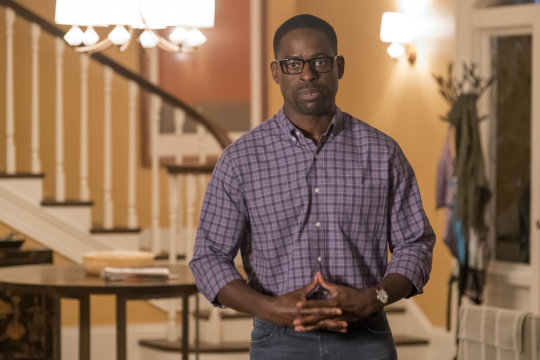

Hey fam! Like I said, I’ve been writing a ton of meta lately and this is another one that’s just been sitting in my drafts. It’s basically a This Is Us and a New Amsterdam meta which is something I haven’t done before but something I want do more of. In my Game of Thrones days I used to write a lot of meta about shows and characters that had similarities so this is fun for me. I hope y’all enjoy this. ALSO THIS HAS SPOILERS FOR BOTH SHOWS!!!!!!!
Without a doubt the two most popular shows on NBC is This is Us and New Amsterdam. And what’s not to love? They’re both emotionally driven, heartfelt, shows that focus on incredibly deep and complex topics. Though one show focuses on family dynamics and the other focuses on the healthcare system, these shows are very similar in more ways than one. Case in point, Max Goodwin and Randall Pearson. The more I watch these two shows, the more I realize how these two characters are so alike!!! These two men are kind-hearted, well intentioned, individuals who genuinely want to make some sort of positive difference. They are incredibly ambitious and always have “bright ideas” and “goals” they want to accomplish and somehow they’re able to meet those goals without ever having to sacrifice their wants and needs. By every definition these men are the “main characters” or the ultimate “protagonists.” These are the folks that we are supposed to root for. At the same time, though these men have many traits to be admired, when you truly look at it both of them can be incredibly self centered and selfish especially when it pertains to their romantic partners and love interests. No matter how appealing you make these characters out to be these men clearly fall under the Behind Every Great Man trope.
The Behind Every Great Man trope has been used countless of times throughout Cinema and TV History that I’m sure that I don’t even have to explain it to you but for the sake of this meta this is how it’s defined.
“Behind Every Great Man...stands an even greater woman! Or in about a hundred variations is a Stock Phrase referring to how people rarely achieve greatness without support structures that go generally unappreciated, and said support structure is a traditionally female role via being the wife, mother, or sometimes another relation. This trope is specifically about a man who is credited with something important, but owes much of his success to the woman in his life.”
This trope usually has a negative connotation (and rightfully so) because the man who often benefits from this is an asshole and unworthy of this type of support!
For example:
Oliva and Fitz
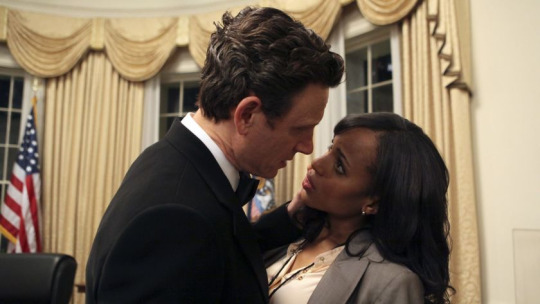
Cristina Yang and Burke
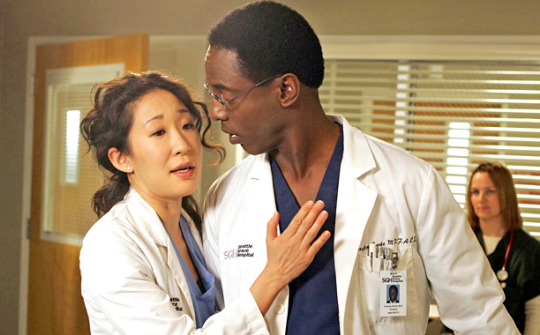
Cookie and Lucious
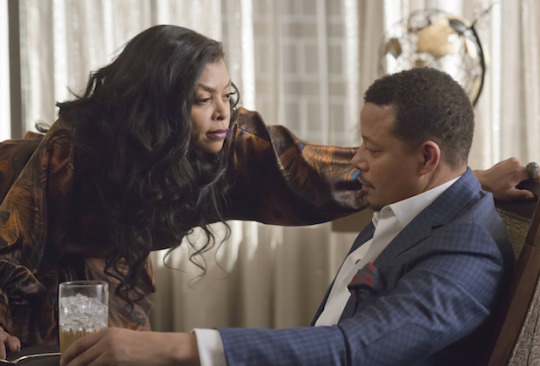
Ghost and Tasha
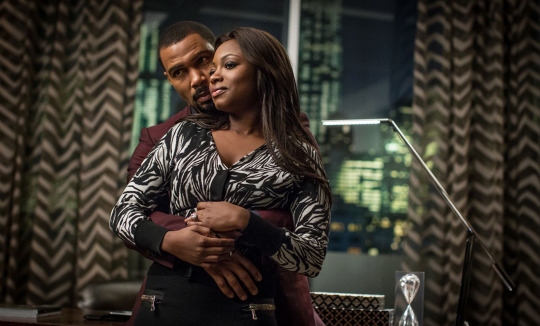
There are countless others but these are a few of the couples that come to mind for me. Randall and Max aren’t comparable to any of these men that are listed above but they are still operating under the same trope. It just looks nicer because Max and Randall are inherently good and inspirational. They are the heroes of the story. I would even argue and say that both men fall under the Chronic Hero Syndrome trope which is defined as
“Chronic Hero Syndrome is an "affliction" of cleaner heroes where for them, every wrong within earshot must be righted, and everyone in need must be helped, preferably by Our Hero themself. While certainly admirable, this may have a few negative side-effects on the hero and those around them. Such heroes could wear themselves out in their attempts to help everyone or become distraught and blame themselves for the one time that they're unable to save the day. Spending so much time and effort saving everyone else can also put a strain on the hero's personal or dating life.”
Just because Max and Randall have these incredibly inspiring aspirations, is it fair that their wives and love interests are always expected to rise to the occasion and support them. Is it ok for their partners to continuously sacrifice their wants and needs because they love these men?
Let’s dive into it.
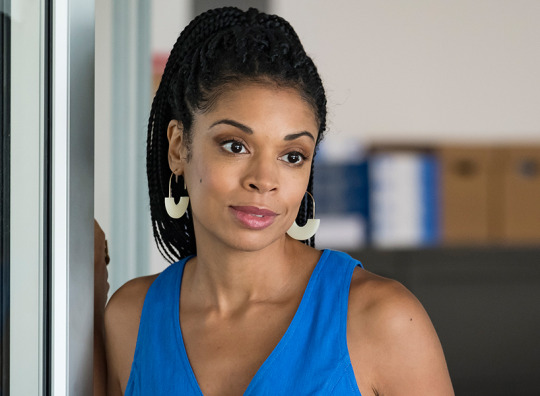
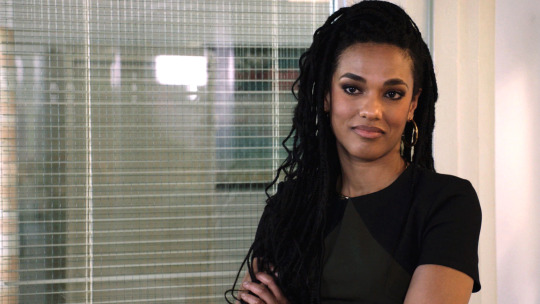
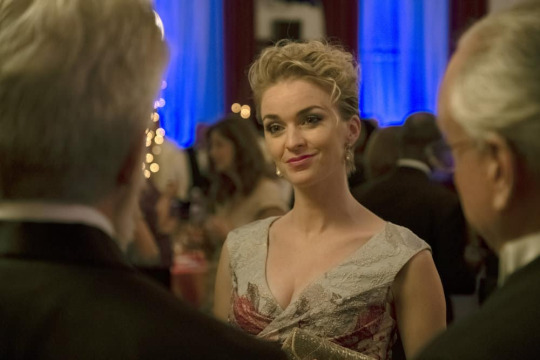
Truth be told, Beth Pearson, Helen Sharpe and Georgia Goodwin had to endure a GREAT DEAL to emotionally support the dreams and aspirations of these men while sacrificing so much of themselves in the process. In media we often see women sacrificing so much of their wants and needs out of love for these male leads and rarely do men do the same thing for their romantic partners and love interests. All three of these women clearly fall under the Act of True Love trope defined as
“The Act of True Love proves beyond doubt that you are ready to put your loved one's interests before your own, that you are truly loyal and devoted to them. Usually this involves a sacrifice on your part, at the very least a considerable effort and/or a great risk. The action must be motivated, not by morals or principle or expectation of future reward, but by sheer personal affection.When your beloved is in dire need of your help, or in great danger, and you do something, at great expense to yourself, for the sake of their safety, their welfare, or their happiness, thus proving beyond any doubt that you put their interest ahead of yours.”
Over the past few seasons we have seen all three of these women truly live up to this trope without any true consequences or accountability from the men they’re making all these sacrifices for. For example, in Beth and Randall’s marriage, how many times did Randall spring an idea on Beth without truly talking to her or considering her wants first? Everyone thinks these two are an ideal couple but she has endured A LOT for Randall.
Randall has spontaneously quit his job, moved his dying biological dad into their home, bought his biological dad’s old apartment building, fostered and adopted a child and also ran for city councilman outside of his district. In all of these decisions, Randall “consulted” Beth about it but at the same time didn’t really consult her. In a way there has always been this expectation of Beth to just go along for the ride with what Randall wants. Is anyone else exhausted from reading that list?! That’s a lot for partner to endure and lovingly support. But Beth has endured and has been Randall’s rock through it all!!! What worries me is that the one time Beth spoke out about her wants and needs of pursuing dance again, he couldn’t match the same energy she was giving him and eventually it led to world war three between them. Though things are looking up in their relationship and he’s starting to support her more, has Randall nearly given to Beth as much as she’s given to him? Absolutely not!
Similar to Randall, Max also had a wife who was a dancer. in fact, she was a prima ballerina. Unlike Randall and Beth, Max relationship with Georgia was rocky from the start. When we were first introduced to them Max and Georgia were separated and rightfully so. Georgia was never Max’s first priority. The hospital always came first in their relationship. He couldn’t even dedicate a full night to her for their proposal. In order to “save” their marriage they decide to have a baby and they both committed to taking a step back in their careers in order to do so. The problem was Max didn’t keep his side of their commitment and took a job to become the medical director at the biggest public hospital in the U.S. She gave up her career to start a family and he totally and completely betrayed her trust. So throughout season one we see them trying to rebuild their marriage but even in the midst of trying to rebuild a marriage based on trust and mutual respect Max still keeps things from Georgia. For several episodes he didn’t tell her that he had advance stages of throat cancer. He only told her when Georgia asked him to move back home. That’s fucked up! Then throughout their pregnancy he was never fully there for Georgia because he was either to preoccupied with the hospital or himself. At the end of it all, Georgia died tragically at the beginning of season two and really had nothing to show for it in her relationship with Max other than her daughter Luna.
Now let’s bring Helen Sharpe into the fold. While all of this stuff was going on with Max and his wife in season one, Max was developing a deep friendship, borderline emotional affair with Helen. Their relationship started out with Helen being his oncologist. As the new Medical Director of New Amsterdam, he swore Helen to secrecy about his diagnosis so that he could still run the hospital. Through that secrecy they eventually formed a deep bond but as his cancer got worse his secret was let out of the bag. He realistically needed someone to step up and run the hospital when he was going through chemo and though Helen already had commitments she stepped up and became his deputy medical director. Somewhere along the lines Max and Helen started developing feelings for each other. As Helen becomes aware of those feelings, she made a choice and decides to remove herself as Max’s doctor. He BITCHES about it but eventually accepts the boundary she’s clearly trying to set. Mind you, as this is unfolding, like Max, Helen is also in a new relationship with her boyfriend Panthaki. As Max’s cancer seems to be getting worse with his new doctor, she goes back on her boundary and decides to be his doctor again. This pisses her boyfriend off because he could already peep the vibe between them and he breaks up with her. When we get into season two, Max’s wife died and Helen set him up in a clinical trail (with a doctor she previously fired) that’s helping his cancer. Unbeknownst to Max, this doctor ends up holding his life saving treatment plan over Helen’s head and in order for his treatment to continue she gives this doctor half of her department!
Helen has sacrificed a lot for Max and now in season three she’s finally prioritizing her current wants and needs first! Like Randall, Max is starting to turn a page and is starting to support Helen and truly listen to the wants and needs that she has. All of this is good but my question is did any of these women have to sacrifice so much for the men in their lives to get a clue?
Why is it that this is a trope we see in media time and time and time again? Even if these men are good, why don’t we still keep these male characters accountable when they put their significant others in these situations that are clearly not fair? I’ve watched countless tv shows and I’ve seen a lot of tv couples but I think I have only come across one couple where the male counterpart has selflessly loved his significant other and has always put her needs above his own.
That character my friend is none other than PACEY WITTER
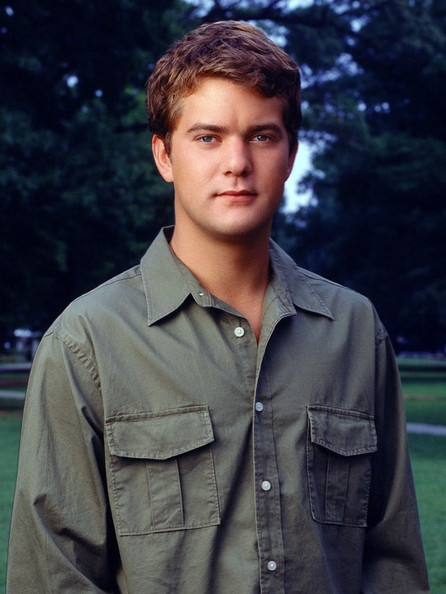
I might be mistaken but I think Joey and Pacey are the most popular ship in tv history and honestly, rightfully so! This is only example I can think of where the male in the relationship so willingly puts the wants and needs of his partner first. It is a completely selfless and sacrificial love. He never wants to hold her back and he never asks her to compromise her wants or needs for him. That’s why I think so many women love Pacey because in a sea of TV relationships, Pacey Witter is a fucking unicorn.
So to wrap this up does this mean that I hate Randall Pearson or Max Goodwin? No! I adore them. I love both of their characters so much. I just think that when we see the media continuously play out the sacrificial wife/love interest for the sake of their male counterparts, it should be called out. I’m all about sacrificial and selfless love but it should come from both sides.❤️❤️❤️
Anyway I hope y’all enjoy this! As always my DMs are opening here or on Twitter @oyindaodewale
#new amsterdam#sharpwin#This Is US#max goodwin#helen sharpe#randall pearson#beth pearson#georgia goodwin#pacey witter#joey x pacey#new amsterdam meta
89 notes
·
View notes
Text
girlbosses, male wives, and other lesbian genders
a post about jing wei qing shang. but also mostly about another unrelated movie. spoiler-free.
for a lot of people, mulan 1998 is their definitive “ohhh i’m a chinese woman dressing as a man for contrived reasons and i get absolutely nooo erotic pleasure from this” movie.
however, because i am very special and unique, for me it’s the love eterne 1963. it’s the shaw brothers adaptation of butterfly lovers, the classic chinese folktale. here’s how i’d summarize the movie:
zhu yingtai, an aspiring scholar, convinces her parents to let her dress as a man to attend school. on the way there, she meets liang shanbo, another prospective student, and they become sworn brothers. they study together for three years, growing closer, until zhu yingtai returns home. liang shangbo accompanies her for the eighteen-li journey home while she hints she’s a woman, but he remains oblivious. by the time he learns her gender, her parents have engaged her to another man. he dies of grief, and while she mourns at his grave, it splits open, and she buries herself inside with him. two scraps of her torn outfit turn into butterflies and fly away.
it’s worth noting here that like. this movie is made in the huangmei opera style. so both zhu yingtai and liang shanbo are played by women (betty loh ti and ivy ling po respectively). because of this, basically every level of the film is preoccupied with gender: if we take zhu yingtai’s male performance as credible (as the characters in the movie do) the leads bond through male homoeroticism; the text is ultimately about a heterosexual romance; it is acted out by two women, in a performance that is difficult to mistake as heterosexual or even feminine; and the dialogue of the movie can’t help but remark on this.
basically it asks: what if lesbians could be gay both ways? wouldn’t that be based?
like opera was traditionally made by single gender casts, so roles tended to be genderless, in that the gender of the actor doesn’t determine the gender of the role they play. roles are instead typed into four categories: dan (fem), sheng (masc), chou (clown), and jing (painted face). it’s a sick gender quadinary. each of these roles has further subtypes that are represented through stylized patterns of singing, makeup, costuming, movement etc.
so in butterfly lovers, betty loh ti plays a dan, and ivy ling po plays a sheng. but because of the textual cross-gender play, you end up with a woman playing a woman playing a man who falls in love with a woman playing a man.
i’m going to make a brief digression here into talking about like.. acting theory. in the european tradition, you see it evolving out of early concerns (from stanislavski, brecht) about the fourth wall, and its permeability or lack thereof. in chinese opera tradition, the fourth wall didn’t ever really exist. and mei lanfang, the legendary fanchuan performer, claimed that his success wasn’t just due to his appearance, but rather, his mastery of some nonliteral feminine subjectivity.
If I kept my male feelings, even just a trace, it will betray my true self; then how can I compete for the audience’s affection for feminine beauty and guile?
i’m not going to argue that there’s like, an essence to being a woman because i’m not a fucking idiot. but there’s something to be said for the idea that the gendered interplay between the audience’s perception of the actor, the actor’s perception of themself, and the character they play is a massive part of the appeal of fanchuan performance.
this is echoed by david hwang’s m. butterfly, in which gallimard memorably says, “i’m a man who loved a woman created by a man. everything else—simply falls short.” btw sorry for having the type of brain disease where i constantly reference chinese crossdressing related media. you already know why i have it.
anyway. parallel to that (but far less morally detestably), jin jiang argues “young male impersonators in yue opera embody women’s ideal men—elegant, graceful, capable, caring, gentle, and loyal.” so, trivially, 1) the eroticism embodied by fanchuan performers is distinctly different from their “straight” counterparts, and perhaps less trivially 2) it’s way better.
back to the love eterne for a bit. one of the many reasons it’s lodged itself into my psyche is because there’s something more interesting at play than just all that. normally in opera, to compensate for any perceived residual femininity in the sheng, the dan camps it up even further. so this is how zhu yingtai first appears, this bratty femme pastiche of womanhood. yet within a couple minutes she’s dressed as a man, which she’ll stay as for the bulk of the movie. they do however make compromises with the makeup--more gently lifted eyebrows than the steep angles of the sheng opera beat, and an improbably masculine smoky eye.
that’s right. they performed girlbossification on her.
i don’t want to suggest that she’s straightforwardly feminine. i could write an entire other thing on her relationship to masculinity. instead i want to highlight the erotic interplay not just between the “girl” and the “boss” but also between her and her counterpart: the male wife.
liang shanbo is ostensibly straightforwardly male, but his relationship with zhu yingtai isn’t gay in the ahaha what if i was into my bro way-- it’s a what if i was into my bro and i was his wife way.
that’s right. they performed force fem on a cis woman-man. like when zhu yingtai tells him he can’t watch over her as she recovers from an illness because “boys and girls can’t sleep together,” liang shanbo asks “are you implying that I’m a girl?”
there’s a lot of shit like this that builds up over the course of the movie. it all culminates in that final 18 mile journey. along the way, zhu yingtai compares them to a pair of mandarin ducks, one male & one female. liang shanbo sputters “i am a man inside out-- you shouldn’t--” before graciously conceding, “you may compare me to a woman.”
this is like. a simple punchline. but it’s incredible. it’s true! liang shanbo isn’t a man inside out in that he’s a man and only a man, but rather that he’s a man seen inside first, built for desiring, by a woman & for a woman. as a perpetual object, he becomes a more believable woman than zhu yingtai. and at least in his view, it seems more likely that he could be a woman than her. but beyond that, his permissive tone reads as a kind of wanting in itself--recast, if she wants, “for you, i’ll be a woman.”
obviously this is a classic lesbian mood. who among us has not seen “no gender only lesbian” posts. and speaking of classic lesbians, you might ask. did you just tiresomely reinvent butches and femmes but with a more annoying name? yes. no. okay. well.
first, like butch/femme dynamics have both historical specificity and a classed character such that it’s not rlly that appropriate to impose them on the love eterne. and i guess more importantly, i wanna talk about stuff that isn’t real.
we fight all day about people who confuse performance with performativity, (i use we lightly here. for instance, i go outside every day so i don’t care about discourse) but what if we actually wanted to talk about the former for once? something specifically, whether we choose or are forced into it, that we pretend to be?
anyway. what the hell does all that have to do with jing wei qing shang. i’m going to start by first making the argument that there’s no such thing as a naturally occurring girlboss. i think, honestly, she’s a product of capitalism (“boss” should be the tipoff here) but because both of these stories are set in ambiguously historical china, i’m going to say, instead that she’s a product of uhhh primitive accumulation.
semantics so that i can be canon compliant with marxism aside, if girlbosses are made not born, can you choose to be a girlboss? sheryl sandberg says yes. i don’t disagree, i guess, but i will say: stop glamorizing it! humans only become girlbosses when they’re greatly distressed.
you become a girlboss when you have no other choice not to be one. when your wants are too great to be a woman, when the things you want are not things that women should want-- whether that’s something that really no one should want, like being a ceo, or whether that’s just something like loving a woman (or, as it is quite often, both) -- you have to become something else.
another important part of being a girlboss is that other people are not. your excesses mean that not only do you lose something in the process, but your bosshood comes at the expense of others. the girlboss necessitates a girlworker, or so to speak.
now we’re getting to jwqs. i’m assuming that you haven’t read jwqs, because most people haven’t. that was me until like four days ago. in broad strokes, the novel is about a woman, qiyan agula, who was raised as a prince, and her quest for revenge against the kingdom who slaughtered her people. of course, this involves marrying one of the princesses of that kingdom. it’s all very exciting (lesbian).
what’s striking about jwqs is that both of them seem to fit the girlboss paradigm, in vaguely similar ways. qi yan (agula’s assumed name) seems to follow the lineage of zhu yingtai, who pretends to be a man to achieve her goals. she’s forced to give up much in the process, and also sacrifices a, uh, lot of innocent people. similarly, nangong jingnu, the princess, is inherently a girlboss because royalty sucks. but also, qi yan girlbossifies her over the course of their relationship.
but i wouldn’t say jwqs is girlboss4girlboss. there’s something a little more complicated happening. qi yan isn’t zhu yingtai in that she’s a dan pretending to be a sheng. it seems more like that she was a sheng all along. it’s something that the women of the novel return to often: qi yan seems to be better than a man.
for instance, nangong sunu, jingnu’s older sister, reflects on this.
Nangong Sunu had seen many foolishly loving women who sacrificed everything for the sake of their husbands, but there were rarely any men who would do the same for them.
(...)
Thinking it through, Nangong Sunu felt that Qi Yan was truly becoming more interesting. She intended to observe discreetly for a while, to verify if such a man truly existed in this world. (ch 221)
and i forgot to write down the citation for this, but nangong jingnu also seems to argue that not only is qi yan prettier than a man, but she also seems to be prettier than a woman. (it’s the bit where she’s watching qi yan sleep. help me out here.)
moreover, the way qi yan relates to nangong jingnu is suggestive. jingnu brings out the elements of wanting to be a woman in her. it’s jingnu’s body that makes her wonder what she would look like if she was more feminine. it’s jingnu’s happiness that she resents, wishing that her people could have that as well. it’s her desire for jingnu that makes her a woman.
(another important distinction i suppose--while one person can’t be both a butch and a femme, because the girlboss and the male wife are things we pretend to be until we embody them / them us -- there’s greater slippage between the two.)
anyway, the girlboss/male wife dynamic is reversed wrt who’s actually dressing as a different gender. that suggests an inversion in the implications we see from the love eterne, if we are to take the love eterne as the paradigmatic girlboss text. which i do, for no reason in particular.
so then, is qi yan pretending to be a man? under the opera framework, we’re forced to say no. she’s not pretending to be a man any more so than liang shanbo (as acted by ivy ling po) was. but that, of course, feels incorrect, just looking at the text. is she, then, pretending to be a sheng? i’d strongly say no. the things that others see in her, they authentically see; and she does authentically feel the same things as liang shanbo wrt femininity.
so it has to be the opera framework that jwqs is subverting then. if qi yan kept some trace of her once-womanhood, if qi yan reveals her true self, and yet she still can compete for the audience’s affection-- jwqs’s inversion of the opera framework seems to argue instead that it’s that true self that allows you to compete. it’s being masc that lets you be a desirable woman; it’s being feminine that lets you be a desirable man.
there’s an increased gender ambivalence to jwqs, which make sense, i guess, seeing as it’s not meant to be a het story the way that the love eterne was. for instance, nangong jingnu crossdresses to go out in public, and qi yan remarks that jingnu’s disguise fooled her on their first meeting. when qi yan and jingnu go out in public, both disguised as men, they’re repeatedly perceived as a gay male couple. there’s freedom in that: they could be gay women only privately, they could be straight officially, but they could be anonymously gay publicly.
so it’s through the gay male pretense that they can be gay women; it’s through the qi yan pretense that agula can love women; it’s the qi yan caring husband persona that coaxes jingnu in caring for qi yan in return-- jwqs, more precisely, argues that you can’t be a woman if you’re going to love them, and even less so if you’re going to be loved by one.
this is perhaps well-trodden ground for anyone who has read wittig & certainly many people who haven’t. but it’s the layer of pretense that for me complicates these two narratives.
i think it’s a relatable feeling: wanting something anticipating getting something, or wanting something for yourself anticipating knowing that you already had it. that is, desire in itself being constitutive of that reality.
or less abstractly, knowing that you’d want to be a lesbian if you could, knowing that you’d want not to be a woman if you could-- anticipating any realization of either.
the dramatic excesses & wants of the girlboss, i think, are a decent literary stand in for being a lesbian.
i wanna note here that this is rlly just based on my experience being a transmisogyny exempt nonbinary diaspora lesbian lol. it’s fun & cathartic to overread this history & place myself in the accidental implications.
i don’t think most of the things i say are literally true. and i don’t want to overstep & say any of this can be generalized. please lmk if something here doesn’t read right! ok kisses bye
171 notes
·
View notes
Note
yesterday was book day, tell me something about a book you love 💖
bonus q: since it was also sant jordi... tell me about the moros i cristians festival (if you feel like ofc)
thank youuuu (este sí que es un ask de hoy jeje)
i feel i have the moral obligation to talk about ovid's heroids for the nth time because it's so!!!!
it's basically a collection of fictional letters heroines from greek and roman myths and stories (also some historical figures) are writing to their respective heros after they got abandoned / betrayed / etc, you get the gist. they're full of drama, and angst, and it's so good i had to stop myself everytime i read a letter to process everything that was happening lol.
here are some random extracts so you can see how they are, i'll also translate them to english for any non-spanish speaker who might see this :)
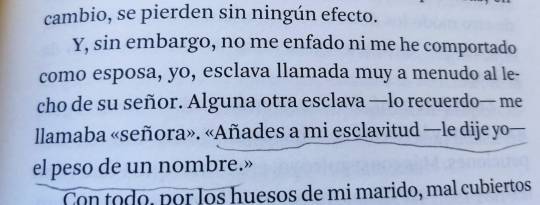
this is from the letter from briseis to achilles, in the letter she laments how he barely paid attention to her.
"and, however, i am not mad nor have behaved as a wife, me, a slave, very often called to her lord's bed. another slave - i remember - called me 'madam'. 'you are adding to my slavery - i told her - the burden of a name'."

this is from the letter from sappho to phaon (according to legend, sappho fell for this man but he didn't correspond her; distraught and heartbroken, she threw herself off a cliff and drowned).
"undoubtedly you will also be wondering why are my verses in groups of two, even if i am, truthfully, more expert in lyrical rythms: i have to cry for my love, and the elegiac poem is also tearful; no lyre is adequate for my tears".

this is from the letter from phaedra to hippolitus (phaedra, wife of theseus, fell in love with her son-in-law, hippolitus; the context of this extract is detailing the fact that hippolitus is a bastard so he has no right to the throne of athens, while phaedra gave theseus legitimate sons)
"oh, how i wish my guts had exploded in the middle of childbirth, knowing they were going to harm you, the most beautiful of beings!"
anyways, it's really good and i couldn't recommend it enough
this got a bit lengthy, so i'll put everything about moros i cristians below the cut lol
so, in my dad's hometown moros i cristians happens on the last weekend of april and it's part of the mare de deu de la salut celebrations; the first week has all the more traditional festivities stuff (processions, corridas, verbenas, etc) plus, on the night the festivities start they do the fogueres, which are basically just that, bonfires lit all over the town! apparently it all stems for this one big plague that happened in the town on the 15th century (i think) that was quelled by an apparition of the virgin mary (thus la mare de deu de la salut), the bonfires are a reminder of the bonfires set to burn the infected bodies and such
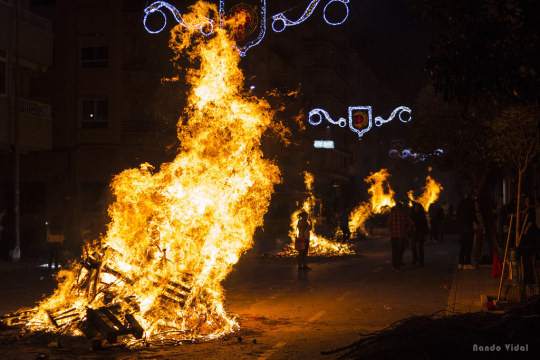
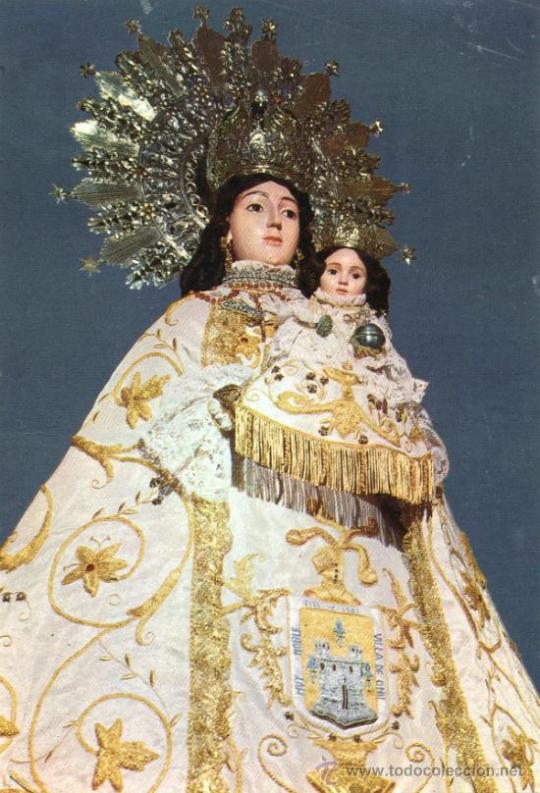
but then, the fun starts on the second weekend!!! there's when the moros i cristians stuff happens; everyone gets divided into these two factions (and within the faction there's groups and squads and all that jazz) and it's all very fun, everyone's drunk and happy and it's all great!! the festivities consists of formal parades (la entrada), informal parades (la volta), theatralized embassies (la embajada) and recreations of the battles with a lot of gunpowder that end in a mascletá and the baile de las banderas, where the winner (first the moors, then the christians) wave their flags and suff. there's also some minor processions and the last day, may 1st, is the 'día de la virgen', when the statue of the mare de deu de la salut goes back from the top of the mountain to the church, by night, and everyone is dressed up and with candles and it's super pretty!
here are some pics of me and my family's experience throughout the years :)
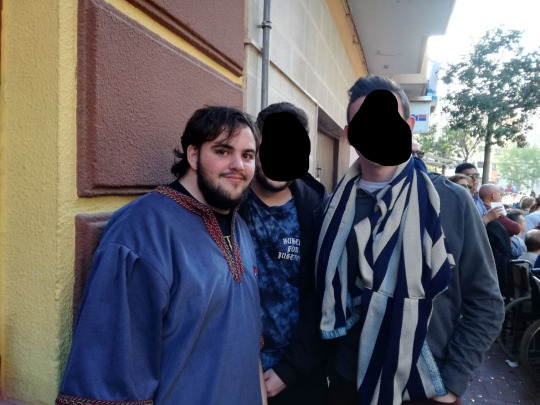
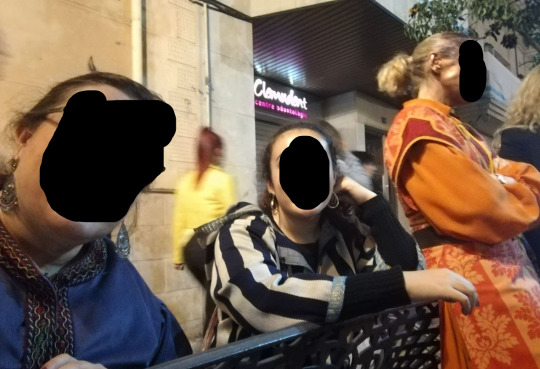
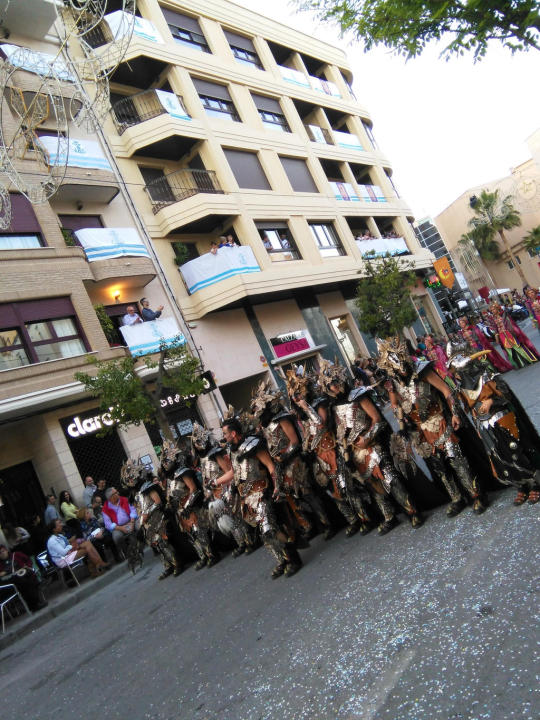
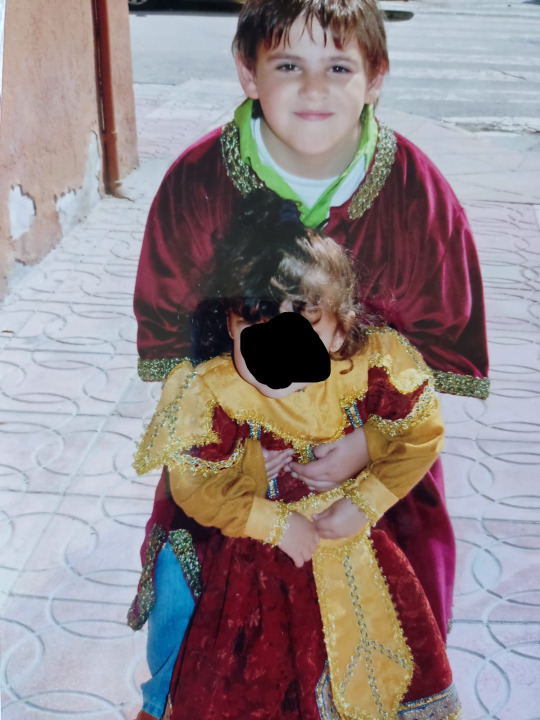
#ask#sunday asks#sorry for the long post!!!#anyways heroids is so good it's insane#also yes the heroids are technically fanfiction lol#also if it wasn't obvious the video is from the mascletá lol
4 notes
·
View notes